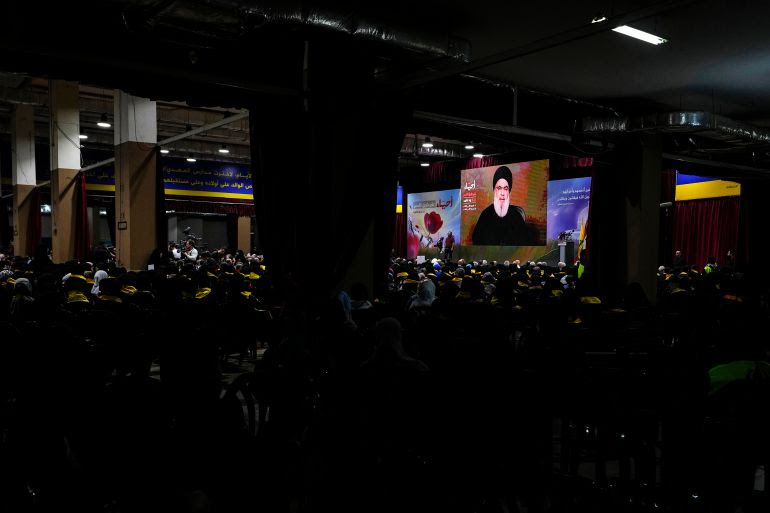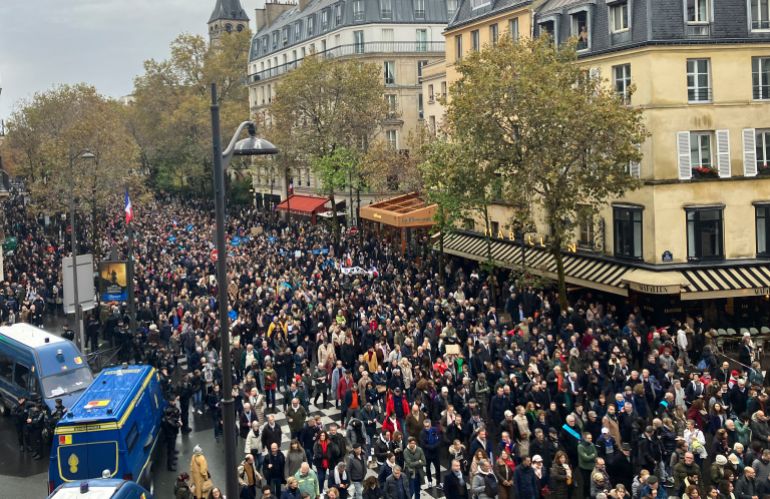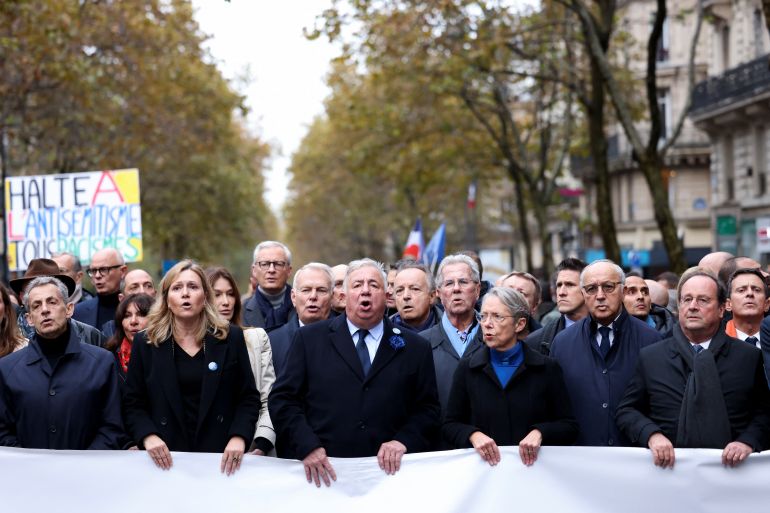Israel Gaza Palestine War
IsraelGazaPalestineWar
"The Gate Is Open" ..
A new explosive INLTV News Book and Film Being Made Exposing The Hidden Darker Hidden Side of How and Why The Israel Gaza Hamas Palestinian War Started and Who Was Behind Arranging The Spark That Gave An Excuse For Israel and its USA War Crime Partners To Start Such War.
The Gate Is Open" ..
A new explosive INLTV News Book and Film Being Made Exposing The Hidden Darker Hidden Side of How and Why The Israel Gaza Hamas Palestinian War Started and Who Was Behind Arranging The Spark That Gave Israel and its USA Partners in War Crimes To Set About Demolishing Gaza and deliberately murdering thousands of innocent women and children, along with causing over 50,000 Palestinians to be injured by Israeli and US Bombs, Guns and Rockets, and the murder of more than 60 journalists ..using starvation and a lack of safe clean water and crowded tent cities with no toilets or bathrooms, the Gaza Palestinians have been forced moved to as a result of their homes being regularity bombed by Israeli and US Bombs and Rockets
Israel-Gaza war
The Ben Gurion Canal project
One of the original planned paths would go through the Arabah valley, cut west before the Dead Sea basin through the hills and curves north again to avoid the Gaza Strip
Why Gaza matters
The US had once proposed to use some 520 nuclear bombs on the Negev Desert (Naqab) to help create the canal. With Gaza razed to the ground, there have been alleged plans to literally cut corners and reduce costs by diverting the canal straight through the middle of the Palestinian enclave. However, the presence of Palestinians there would remain an obstacle.
Since Israel launched its onslaught on the besieged enclave, it has pushed Palestinians to move south by relentlessly bombing northern Gaza before carrying out a ground invasion weeks later. At least 400,000 Palestinians have been displaced from the north to the south, according to statistics from the Palestinian Central Bureau of Statistics (PCBS).
Some 800,000 Palestinians remained in areas considered "north" - namely past north of Wadi Gaza. Israel's indiscriminate bombing campaign, which has mostly targeted the north - has killed at least 11,470 people in Gaza - mostly civilians, including women and children.
The death toll has not been updated for days due to Israel's targeting of the largest hospital in Gaza, Al-Shifa, which was a centre for collecting data on deaths and the wounded.
Israel denies it has plans to annex the Strip but it had called for the "voluntary migration" of Palestinians in Gaza amid accusations that it was "ethnically cleansing" the enclave.
Israel wants to take control of the Philadelphi Corridor

The Philadelphi Route is located along the Egypt-Gaza border
Is this all part of Israel's long tern plan to build An alternative to the Suez Canal which seems central to Israel’s genocide of the Palestinians in Gaza?
https://www.newarab.com/news/what-israels-ben-gurion-canal-plan-and-why-gaza-matters
What is Israel's Ben Gurion canal plan and why Gaza matters
As Israel intensifies its Gaza onslaught, focus turns to the controversial Ben Gurion Canal Project, originally proposed in the 1960s as an alternative to the Suez Canal.
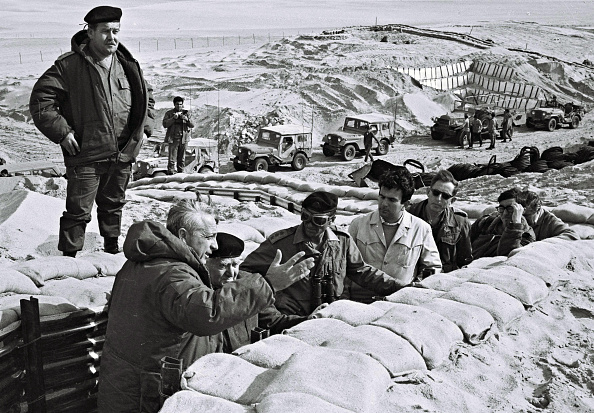
Ariel Sharon gestures as he briefs former Israeli Prime Minister David Ben Gurion in an army trench in 1971 near the Suez Canal
As Israel continues its onslaught on the besieged Gaza Strip, talks about a long-discussed economic opportunity known as the Ben Gurion Canal Project have surfaced online.
Named after Israel's founding father, David Ben-Gurion, the project, conceived in the late 1960s, sought to create an alternative route to the Suez Canal, the primary shipping route connecting Europe and Asia.
While Israel rejects calls for a ceasefire and its military campaign on Gaza shows no sign of an immediate end, it becomes crucial to delve into the historical context of the Ben Gurion Canal Project, its proposed significance, and the intricate geopolitics surrounding the Suez Canal.
Understanding the motivations behind the proposal requires exploring the complex history of the Suez Canal, the Tripartite Aggression of 1956, and the unexpected shocks to world trade resulting from its closures.
This backdrop underscores the potential strategic importance of an alternative canal, controlled by Israel, in the ever-evolving dynamics of the region.
The Philadelphi Route, also called Philadelphi Corridor, is a narrow strip of land, 14 km (8.699 miles) in length, situated along the entirety of the border between Gaza Strip and Egypt. Under the provisions of the Egypt–Israel peace treaty of 1979, it was established as a buffer zone controlled and patrolled by Israeli forces. One purpose of the Philadelphi Route was to prevent the movement of illegal materials (including weapons and ammunition) and people between Egypt and the Gaza Strip. Palestinians have built smuggling tunnels under the Philadelphi Route to move these into the Gaza Strip.
After the 1993 Oslo Accords, Israel was allowed to retain the security corridor. Following Israel's unilateral disengagement from the Gaza-strip in 2005, the Philadelphi Accord with Egypt was concluded, which authorized Egypt to deploy 750 border guards along the route to patrol the border on Egypt's side. The Palestinian side of the border was controlled by the Palestinian Authority, until the 2007 takeover by Hamas. The joint authority for the Rafah Border Crossing was transferred to the Palestinian Authority and Egypt for restricted passage by Palestinian ID card holders, and by others by exception
https://en.wikipedia.org/wiki/Philadelphi_Route
Who is Ben Gurion?
David Ben-Gurion (1886–1973) was a prominent Zionist leader from Poland, who was known as the founding father of Israel.
He was described as a ruthless man who gave orders to Zionist militias to see the mass explosion of Palestinians from their lands and facilitated the influx of Jewish immigrants from all over the world into Palestine. He served as the first prime minister of Israel in 1948.
What is the Ben Gurion Canal project?
The Ben Gurion Canal project was a proposal in the 1960s by Israel to connect the Red Sea to the Mediterranean Sea through the southern end of the Gulf of Aqaba. The route was planned via the port city of Eilat and the Jordanian border, through the Arabah Valley for about 100 kilometres between the Negev (Naqab) Mountains and the Jordanian Highlands and veered west before the Dead Sea basin, and heading through a valley in the Negev Mountain (Naqab) Range. It would then head north again to circumvent the Gaza Strip and connect to the Mediterranean Sea.
However, a connection between the Red Sea and the Mediterranean Sea already exists through the Suez Canal - an artificial sea-level waterway in Egypt that offers vessels a direct route between the North Atlantic and the northern Indian oceans, reducing journey distance and time.
The Suez Canal provides the shortest sea route between Asia and Europe and currently handles roughly 12 percent of the world's trade.
Why did Israel propose the project?
The Constantinople International Convention - signed in 1888 by the great European powers of the era - once guaranteed a right of passage via the Suez Canal to all ships during times of war and peace.
However, after the Suez Canal was nationalised in 1956 by then-Egyptian President Gamal Abdel Nasser, Egypt closed off access to the canal on several occasions following the establishment of Israel in 1948 and the violent displacement of Palestinians, also known as the Nakba.
Egypt blocked Israeli vessels from accessing the canal from 1948 until 1950, affecting its ability to trade with East Africa and Asia, and hampering its ability to import oil from the Gulf region.
Access to the Suez Canal was closed to all international shipping in 1956, following the Tripartite Aggression against Egypt, which involved an alliance between Israel, the UK and France who sought to regain control of the Suez Canal and remove Nasser from power.
The canal was effectively closed during the conflict, and the situation escalated into a crisis with international and economic ramifications.
The Suez Canal was also closed for a staggering eight-year period in 1967, at the beginning of the Six-Day War, also known as the Arab–Israeli War, which was fought between Israel and a coalition of Arab states (primarily Egypt, Syria, and Jordan).
When all land trade routes were blocked by Arab states, Israel's ability to trade with East Africa and Asia, mainly to import oil from the Persian Gulf, was also severely hampered.
The closure of the canal was also a significant and unexpected shock to world trade and disrupted global commerce.
An alternative to the Suez Canal, especially one under the authority of key Western ally Israel, would eliminate the potential use of the Suez Canal and the Straits of Tiran as leverage by Egypt against Israel or its allies.
Economic gains
The Suez Canal has been critical in driving Egypt’s economy forward. It earns revenues through tolls and transit fees collected from vessels that pass through the canal.
In 2021, some 20,649 vessels flowed through the Suez Canal - an increase of 10 percent over 2020. In 2022, annual revenue stood at $8 billion in transit fees. The Suez Canal set a new record with an annual revenue of $9.4 billion for the fiscal year that ended 30 June 2023.
While the canal is Egypt's economic centrepiece, attracting investments to the country and leading to the development of services and industries, its primary importance remains to be its ability to facilitate international trade, making an efficient global trade route.
The Ben Gurion Canal, if constructed, would rival the Suez Canal and cause a major financial threat to Egypt.
If it goes ahead, it would be almost one-third longer than the current 193.3km Suez Canal, and whoever controls it will have enormous influence over the global supply routes for oil, grain, and shipping.
The Ben Gurion Canal project
One of the original planned paths would go through the Arabah valley, cut west before the Dead Sea basin through the hills and curves north again to avoid the Gaza Strip
Why Gaza matters
The US had once proposed to use some 520 nuclear bombs on the Negev Desert (Naqab) to help create the canal. With Gaza razed to the ground, there have been alleged plans to literally cut corners and reduce costs by diverting the canal straight through the middle of the Palestinian enclave. However, the presence of Palestinians there would remain an obstacle.
Since Israel launched its onslaught on the besieged enclave, it has pushed Palestinians to move south by relentlessly bombing northern Gaza before carrying out a ground invasion weeks later. At least 400,000 Palestinians have been displaced from the north to the south, according to statistics from the Palestinian Central Bureau of Statistics (PCBS).
Some 800,000 Palestinians remained in areas considered "north" - namely past north of Wadi Gaza. Israel's indiscriminate bombing campaign, which has mostly targeted the north - has killed at least 11,470 people in Gaza - mostly civilians, including women and children.
The death toll has not been updated for days due to Israel's targeting of the largest hospital in Gaza, Al-Shifa, which was a centre for collecting data on deaths and the wounded.
Israel denies it has plans to annex the Strip but it had called for the "voluntary migration" of Palestinians in Gaza amid accusations that it was "ethnically cleansing" the enclave.
Isra
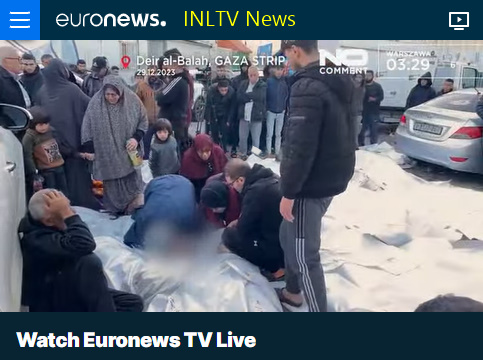
Israel's Genocide Of Palestinian People In Gaza
Euros News INLTV News
Irsrael's Genocide Of Palestinian People In Gaza 29th December 2023
Euros News INLTV News
Israel mounts fiercest attacks so far in Gaza war against Hamas
‘No place safe for children in Gaza’: UNICEF
Gaza Israel Drone footage captured damage in both Gaza and Israel as truce holds
Analysis:
How long will Hezbollah’s Nasrallah hold back against Israel? | Israel-Palestine conflict News |
Al Jazeera
Israel Hamas War Update-
हिजबुल्लाह का दावाथराल्लाह से किया-हमला-
War News Palestine Joe Biden
More than 3,600 Palestinian children killed in war: Gaza Health Ministry | AP News
It's All About Big Business and The Economy Stupid
How The Rothschilds Got Christian Zionist Evangelicals On Their Side Before Israel Even Existed
V48 Nov 2 2023 by Makia Freeman.
Journalist Bursts Into Tears While
Greater Israel Hamas Op Picks Up Where 911 And The War On Terror Left Off
Nov 14 2023 by Makia Freeman
Journalist Shares Her Life Under Si
JournalistBurstsIntoTearsWhile
Israel's Proposed Final Solution For The Palestinians
V45 Nov 16 2023 by Makia Freeman
Journalist In Israel Breaks Down Re
Hamas Attacks In Israel LIve Footag
Hamas Attacks In Israel Live Footag
Mounting evidence and reports of the 7th October 2023 attack on Israel with Israeli hostages taken was a well planned Israeli Mossad False Flag Operation created as a excuse to the world to completely level Northern Gaza Strip with rockets, bombs, bulldosers and tanks, kill thousands of Palestinian men, women and children, and make over two million Palestinians homeless and force those still living to flee the Northern Gaza Strip to make way to build an new Canal through Israel and The Gaza Strip as analternative to the Suez Canal.EU nations condemn Hamas for what they describe as use of hospitals, civilians as ‘human shields’
Israel mounts fiercest attacks so far in Gaza war against Hamas






Israel reported its forces, backed by war planes, on Tuesday reached the heart of Khan Younis in southern Gaza and also surrounded the city. Hamas' armed wing, the al Qassam Brigades, said its fighters engaged in violent clashes with Israelis.
We are in the most intense day since the beginning of the ground operation," the commander of the Israeli military's Southern Command, General Yaron Finkelman, said in a statement.
The combat was also the most intense since a truce between Israel and Hamas collapsed last week. Israeli forces also fought in Jabalia, a large urban refugee camp and Hamas hotbed in the north next to Gaza City, and in Shuja'iyya to the east, Finkelman said.
Hamas' armed wing said it killed or wounded eight Israeli troops and destroyed 24 military vehicles on Tuesday. An Israeli military website listed two troop deaths for Tuesday and 83 since the ground operation began.
Gaza health officials said many civilians were killed in an Israeli strike on houses in Deir al-Balah, north of Khan Younis. Dr Eyad Al-Jabri, head of the Shuhada Al-Aqsa Hospital there, told Reuters at least 45 people were killed. Reuters could not reach the area nor confirm the toll.
Israel unleashed its campaign in response to an attack on Oct. 7 by Hamas fighters who rampaged through Israeli towns, killing 1,200 people and seizing 240 hostages, according to Israel's tally.
Israeli police are investigating alleged sexual crimes and Israel's justice ministry has said "victims were tortured, physically abused, raped, burned alive, and dismembered".
Hamas' media office said on Tuesday at least 16,248 people including 7,112 children and 4,885 women had been killed in Gaza by Israel's military since Oct. 7. Thousands more are missing and feared buried under rubble.
Those figures were not immediately verified by the Gaza health ministry.
U.S. PRESSURE ON ISRAEL
Since the truce collapsed, Israel has been posting an online map to tell Gazans which parts of the enclave to evacuate to avoid attacks. Khan Younis' eastern quarter was marked on Monday, and many of its hundreds of thousands of residents took flight on foot.
azans say there is no safe place, with remaining towns and shelters already overwhelmed, and Israel continuing to bomb the areas where it is telling people to go.
At Khan Younis' main Nasser hospital, the wounded arrived by ambulance, car, flatbed truck and donkey cart after what survivors described as a strike on a school being used as a shelter for the displaced.
Inside a ward, almost every inch of blood-splattered floor space was taken up by the wounded including small children, with medics hurrying from patient to patient while relatives wailed.
Two girls were being treated, still covered in dust from the collapse of the house that had buried their family.
"My parents are under the rubble," sobbed one child. "I want my mum, I want my mum, I want my family."
Amid continued international criticism of Gaza's plight, the United States, Israel's close ally, reiterated on Tuesday that Israel needed to do more to allow fuel and other aid into Gaza and reduce harm to civilians. Despite the mounting death toll, it said Israel was now showing some receptiveness to the calls.
"The level of assistance that's getting in is not sufficient," U.S. State Department spokesperson Matthew Miller said at a press briefing. "It needs to go up, and we've made that clear to the government of Israel."
European Union foreign policy chief Josep Borrell rings a bell to signify the start of a meeting of EU foreign ministers at the European Council building in Brussels, Monday, Nov. 13, 2023. European Union foreign ministers gather Monday to discuss the war in Ukraine and the situation in Israel and Gaza. (AP Photo/Virginia Mayo
European Union foreign policy chief Josep Borrell, third left, speaks with from left, Cypriot Foreign Minister Constantinos Kombos, Greece’s Foreign Minister Giorgos Gerapetritis, Luxembourg’s Foreign Minister Jean Asselborn, Ireland’s Foreign Minister Micheal Martin, Belgium’s Foreign Minister Hadja Lahbib, Netherland’s Foreign Minister Hanke Bruins Slot and Croatia’s Foreign Minister Gordan Grlic Radman during a meeting of EU foreign ministers at the European Council building in Brussels, Monday, Nov. 13, 2023. European Union foreign ministers gather Monday to discuss the war in Ukraine and the situation in Israel and Gaza. (AP Photo/Virginia Mayo)
European Union foreign policy chief Josep Borrell, fourth left, speaks with from left, Cypriot Foreign Minister Constantinos Kombos, Greece’s Foreign Minister Giorgos Gerapetritis, Luxembourg’s Foreign Minister Jean Asselborn, Belgium’s Foreign Minister Hadja Lahbib and Netherland’s Foreign Minister Hanke Bruins Slot during a meeting of EU foreign ministers at the European Council building in Brussels, Monday, Nov. 13, 2023. European Union foreign ministers gather Monday to discuss the war in Ukraine and the situation in Israel and Gaza. (AP Photo/Virginia Mayo)
What It Is Claimed That Hamas Is Doing To Israeli Women Is A War Crime ..
Says US Senator Marsha Blackburn
BRUSSELS (AP) — The 27 European Union nations have jointly condemned Hamas for what they described as the use of hospitals and civilians as “human shields” in the war against Israel.
EU foreign affairs chief Josep Borrell said Monday that at the same time the bloc asked Israel “for maximum restraint in targeting in order to avoid human casualties.”
At a meeting of the bloc’s foreign affairs ministers, Borrell brandished a statement he issued on behalf of the 27 nations as a show of unity following weeks of often contrasting statements on how the group should address the Israel-Hamas war.
Israel is bombing hospitals in Gaza with Israeli doctors’ approval
We, Palestinian doctors in Israel, are forced to watch in silence massacres unfolding, which some of our Israeli colleagues are encouraging.
“THEY LEFT US WITH NOTHING. ABSOLUTELY NOTHING.Israel Gaza: Children must be off limits, says father of abducted kids - BBC News
Israel-Hamas war live: Hospital patients face ‘inevitable death’ – Minister
Wounded treated at Nasser hospital after latest attacks on Khan Younis
650 patients in danger at al-Shifa Hospital: Director general
Number of Palestinians killed in Israeli attacks surpasses 11,100: Health Ministry
The number of deaths in the ongoing Israeli military attacks since October 7 has surpassed 11,100, including more than 8,000 children and women, the government media office in Gaza said on Sunday.
More than 11,200 Palestinians — two-thirds of them women and minors — have been killed since the war began, according to the Health Ministry in Hamas-run Gaza, which does not differentiate between civilian and militant deaths. About 2,700 people have been reported missing
Anyone wanting a copy of the recorded song
"They're Killing Children In Gsza"
Please send your email request to:
Music Editor
INL World NewsEmail: This email address is being protected from spambots. You need JavaScript enabled to view it.
Israel Wants to Seize Gaza to Build the Ben Gurion Canal-
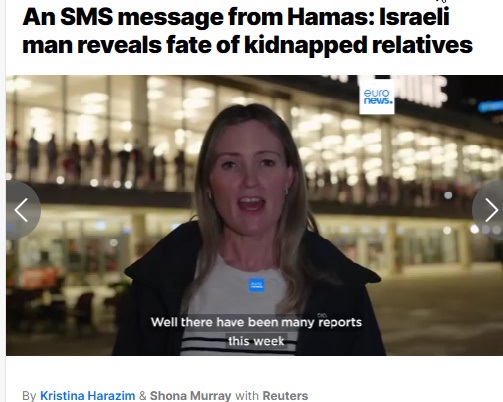
Shorna Murray Euro News Reporter Tel Aviv
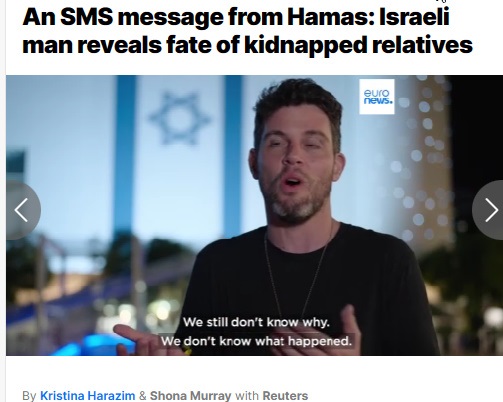
SMS Message From Hamas Reveals To Gil Dickmann Israeli Man Fate of Kidnapped Relatives
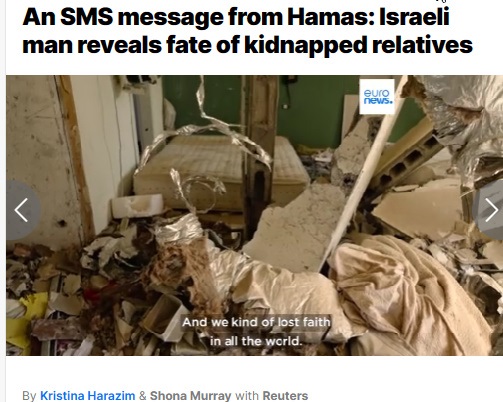
SMS Message From Hamas Reveals To Gil Dickmann Israeli Man Fate of Kidnapped Relatives
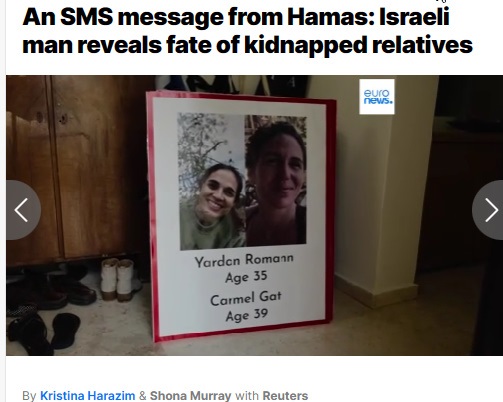
Carmel Gat Age 39 Kidnapped-Yardan Romann Aged 35
An SMS Message From Hamas Reveals To Gil Dickmann an Israeli Man The Fate of Kidnapped Relatives and Offer By Hamas To Swap All The Israeli Hostages For Palestinian In Held In Captivity By Israel Authorities. ..Euro News
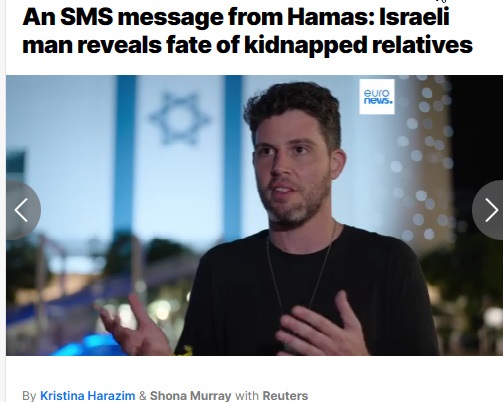
SMS Message From Hamas Reveals To Gil Dickmann Israeli Man Fate of Kidnapped Relatives
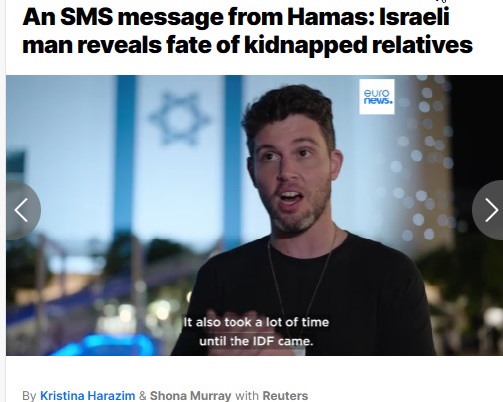
SMS Message From Hamas Reveals To Gil Dickmann Israeli Man Fate of Kidnapped Relatives
Israeli military forces raid Gaza’s largest hospital in operation against Hamas
Palestinians wounded in the Israeli bombardment of the Gaza Strip are brought to a hospital in Deir al-Balah on Tuesday Nov. 14th, 2023.
Hezbollah's Carpet Bombing On Israel After IDF's Shelling In Southern Lebanon
KHAN YOUNIS, Gaza Strip (AP) — The Israeli military raided Gaza’s largest hospital early Wednesday, conducting what it called a targeted operation against Hamas as troops seized broader control of northern Gaza, including capturing the territory’s legislature building and its police headquarters.
In recent days, the focus of the war has been Shifa Hospital, with hundreds of patients, staff and displaced people trapped inside. Shifa had stopped operations over the weekend, as its supplies dwindled and a lack of electricity left it no way to run incubators and other lifesaving equipment. After days without refrigeration, morgue stuff dug a mass grave Tuesday for 120 bodies in the yard.
Amid the standoff, the hospital in the center of Gaza City became a focal point of clashing narratives about the war, now in its sixth week. Israel claims Hamas is using civilians as human shields, while Palestinians, rights group and international critics say Israel is recklessly harming civilians.
The Israeli military said early Wednesday that it raided specific areas of the sprawling Shifa complex, while trying to avoid harming civilians. The statement gave no further details.
Israel has long alleged that the militants conceal military assets in the facility and other hospitals, a claim denied by Hamas and medical staff.
Elsewhere, the Palestinian Red Crescent said Tuesday it had evacuated patients, doctors and displaced families from another Gaza City hospital, Al-Quds.
Israel vowed to end Hamas rule in Gaza after the Oct. 7 attack, which killed some 1,200 people and resulted in the taking of roughly 240 hostages. The Israeli government has acknowledged it doesn’t know what it would do with the territory long-term after Hamas’ defeat.
The Israeli onslaught has been disastrous for Gaza’s 2.3 million Palestinians.
More than 11,200 people, two-thirds of them women and minors, have been killed in Gaza, according to the Palestinian Health Ministry in Ramallah. About 2,700 people have been reported missing. The ministry’s count does not differentiate between civilian and militant deaths.
Almost the entire population of Gaza has squeezed into the southern two-thirds of the tiny territory, where conditions have been deteriorating as bombardment there continues. About 200,000 fled the north in recent days, the U.N. said Tuesday, though tens of thousands are believed to remain.
The U.N. agency for Palestinian refugees said Tuesday that its fuel storage facility in Gaza was empty and that it would soon cease relief operations, including bringing limited supplies of food and medicine in from Egypt for the more than 600,000 people sheltering in U.N.-run schools and other facilities in the south.
“Without fuel, the humanitarian operation in Gaza is coming to an end. Many more people will suffer and will likely die,” said Philippe Lazzarini, the commissioner-general of UNRWA.
Israeli defense officials changed course early Wednesday to allow some 24,000 liters (6,340 gallons) of fuel in for humanitarian efforts, officials said. Earlier, they repeatedly rejected allowing fuel into Gaza saying Hamas would divert it for military use.
Two premature babies die, 37 under threat at Gaza’s al-Shifa Hospital
‘Enough’, says Pope Francis, calling for the war to end
Pope Francis has called for the fighting between Israel and Hamas to end.
Yemen’s Houthis launched strikes at Israel during the war | AP News
Live updates | Israeli tanks enter Gaza’s Shifa Hospital compound
Live updates | Israeli tanks enter Gaza's Shifa Hospital compound | AP News
The Israeli military has released footage that it said shows joint operational activity of two army brigades in its advancement on the ground in Gaza Strip. (Nov.15)
https://apnews.com/article/
Yemen’s Houthis have launched strikes at Israel during the war in Gaza. What threat do they pose?
Houthi supporters chant slogans holding signs reading "Death to America, Death to Israel ", as they attend a rally marking eight years for a Saudi-led coalition, Friday March 26th, 2023 in Sanna,Yemen. For years, the Houthi rebels controlling northern Yemen have chanted slogans at their mass rallies calling for the destruction of Israel. But they never joined any conflict beyond the confines of their own country's civil war or nearby in the Arabian Peninsula. The Iranian- backed Shiite Muslim force has launched at least six drone and missile attacks toward southern Israel since the Israel-Hamas War began on 7th Oct. 2023.
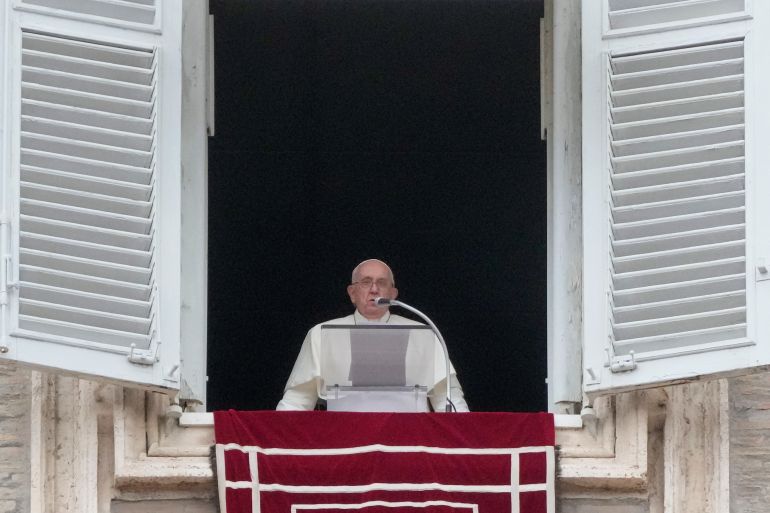
Pope Francis delivers the Angelus noon prayer in St. Peter’s Square at the Vatican, Sunday
“May the weapons fall silent, they will never bring peace, and let the conflict not spread. Enough, enough brothers, enough!” he said while offering prayers at the Vatican.
The Pope also said that the injured in Gaza should be helped and more humanitarian aid should be sent to the besieged enclave.
He added that the people taken as captives by Hamas on October 7 should also be released.
“Every human being, whether Christian, Jew, Muslim, or whatever religion, every human being is sacred, is precious in the eyes of God, and has the right to live in peace,” he said.
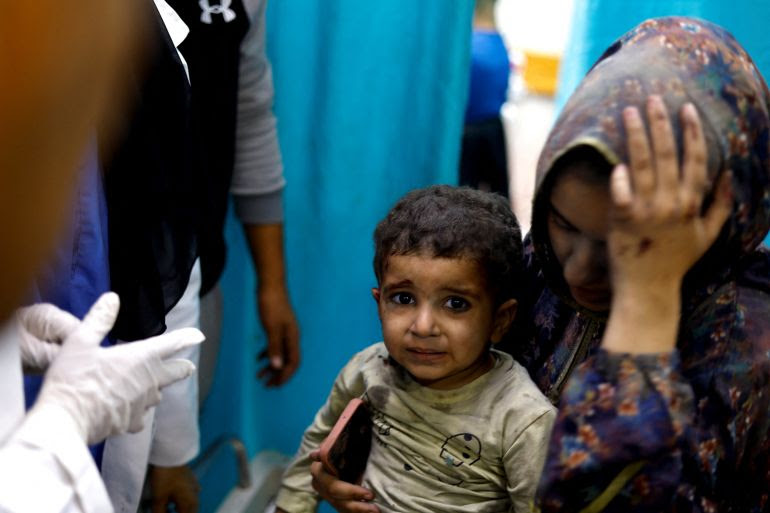
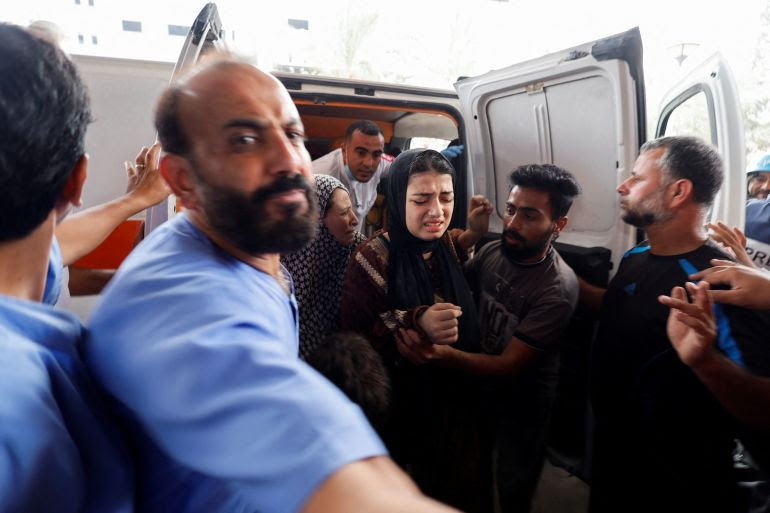
Israel Palestine Conflict History and Ethics (inltv.co.uk)
https://www.bbc.co.uk/news/
Israel-Hamas war live: Al-Shifa cardiac ward destroyed – Health officials
- Gaza City’s al-Shifa Hospital has been caught in Israel’s ground offensive and health officials said its cardiac ward has been destroyed.
- Palestine Red Crescent Society (PRCS) has announced that al-Quds Hospital is no longer operational due to a lack of fuel and a power outage.
650 patients in danger at al-Shifa Hospital: Director general
The director general of hospitals in Gaza has warned that the lives of hundreds of patients are at risk due to the catastrophic situation at al-Shifa Hospital.
About 650 patients, including 36 children, have their lives in danger, Muhammad Zaqout said at a press conference, calling on Egypt to save their lives.
Zaqout also confirmed the presence of “about 1,500 displaced people in the al-Shifa Medical Complex,” warning that “accumulation of garbage and medical waste, lack of water, and power outages threaten everyone’s life”.

Israeli Prime Minister Benjamin Netanyahu has denied that his country has any plans to reoccupy Gaza
Number of Palestinians killed in Israeli attacks surpasses 11,100: Health Ministry
The number of deaths in the ongoing Israeli military attacks since October 7 has surpassed 11,100, including more than 8,000 children and women, the government media office in Gaza said on Sunday.
“Due to the targeting of hospitals and the prevention of entry of any of the bodies or wounded, the Ministry of Health was unable, on Saturday, to issue accurate statistics for the numbers of dead and injured during the past hours,” the media office said in a statement.
“We recall that the occupation [forces] committed more than 1,130 massacres, and the number of casualties reached more than 11,100 dead, including more than 8,000 children and women, and the number of wounded was more than 28,000,” it said.
Earlier this week, Barbara Leaf, assistant secretary of state for Near Eastern affairs, told a House panel that the number of those killed in Gaza is likely “higher than is being cited”.
‘No place safe for children in Gaza’: UNICEF
Palestinians in Lebanon disappointed that Hezbollah won’t escalate
A week after a much-anticipated speech about Israel’s assault on Gaza that did not declare war on Israel, Hezbollah reiterated that message on Saturday.
While it would keep retaliating against Israeli attacks on south Lebanon, Hezbollah leader Hassan Nasrallah said, the war with Israel would be long and victory would “take years”.
His message fell short for many Palestinians in Sabra and Shatila, a Palestinian refugee camp that sprawls out across two Beirut neighbourhoods.
“I wanted him to open up the war completely,” said Abdallah*, 25, one of the Palestinians who gathered anxiously at a sidewalk cafe in Sabra and Shatila to watch the speech.
He is one of nearly 250,000 Palestinians languishing in impoverished refugee camps in Lebanon since they were expelled from their homeland during the creation of Israel in 1948.
Read here their full story.
Where is the ‘responsibility to protect’ in Gaza?
Yesterday’s proponents of the ‘responsibility to protect’ doctrine are today’s biggest supporters of Israel’s genocidal assault on Gaza.
Where is the ‘responsibility to protect’ in Gaza? | Israel-Palestine conflict | Al Jazeera

Civilians flee amid an Israeli bombardment of Rafah in the south of the Gaza Strip on October 29, 2023 [Abed Rahim Khatib/Anadolu via Getty]
On October 18, the Global Centre for the Responsibility to Protect (GCR2P) published an open letter calling for an immediate ceasefire in Israel’s war on Gaza, which has put the territory on “the precipice of a humanitarian catastrophe”. Within a week, it was signed by more than 460 NGOs from all over the world.
Even before the latest Israeli war on Gaza, the GCR2P, which was founded in 2008 to promote the doctrine of the Responsibility to Protect (R2P), issued five warnings this year about atrocities being committed by Israel in the occupied Palestinian territories.
An August 31 report highlighted the “systematic nature of [Israel’s] human rights violations and inhumane acts” in the occupied Palestinian territories, amounting to crimes against humanity or war crimes, including collective punishments and the imposition of an “apartheid”.
Interestingly, some of the most fervent supporters of the R2P doctrine and backers of the GCR2P, the United States and European countries, do not seem to agree with the centre’s assessment of the situation in Gaza. Nor are they upholding the “responsibility to protect” in the case of the Palestinian people being indiscriminately killed by the Israeli forces. Rather they are actively aiding and abetting Israeli war crimes, flouting international legal principles they have spent decades rhetorically promoting.
The emergence of R2P
The roots of the R2P doctrine can be traced back to the international reaction to the recurrence of mass atrocities in conflicts in Bosnia, Rwanda and elsewhere in the 1990s.
Given that the UN was established on the principle of deterring mass atrocities, such as the Holocaust, the proliferation of such crimes, even in the heart of Europe, rang alarm bells in the “never again” camp.
In the run-up to the adoption of R2P, many regional and international actors felt compelled to intervene in civil conflicts. From the early 1990s, the Organisation of African Unity (renamed the African Union in 2002), championed a more proactive stance towards promoting peace, security, democracy and development on the continent.
Sub-regional bodies such as ECOWAS in West Africa and IGAD in East Africa were already actively involved in tackling protracted conflicts in their neighbourhoods, often intervening militarily to end civil wars or reverse military coups. In Europe, the NATO intervention in Kosovo in 1999 cited principles of international humanitarianism.
The UN has practised international interventions since its inception and continues to do so. However, the idea of R2P went beyond habitual international peacekeeping by making sovereignty, a cornerstone of the UN system, conditional.
This idea was first explored in a 1996 book, Sovereignty as Responsibility: Conflict Management in Africa, published by the US-based Brookings Institution. The lead author was the Sudanese-born scholar and diplomat, Francis Deng.
It was further developed in a 2001 report entitled The Responsibility to Protect, published by the Canadian-sponsored International Commission on Intervention and State Sovereignty (ICISS), led by former Australian foreign minister Gareth Evans.
The report argued that international intervention to protect civilians from mass atrocities, including genocide and ethnic cleansing, should happen only when the relevant sovereign state fails to discharge this responsibility. In such a case, the international community should try to assist the affected state or intervene peacefully. Military intervention should be a last resort proportional measure, with good intentions and reasonable prospects of success.
In 2005, the World Summit was held at the UN headquarters in New York to address a number of pressing global issues. R2P was among the main commitments expressed in the World Summit Outcome Document, signed unanimously by 170 heads of state and government.
Since its adoption, the doctrine was invoked in quite a few UN Security Council resolutions, starting with Resolution 1706 on Darfur in 2006, followed by Resolutions 1970 and 1973 on Libya, Resolution 1975 on Côte d’Ivoire and Resolution 2014 on Yemen – all issued in 2011.
The resolution on Libya was followed by international intervention in its civil war, which provoked a strong backlash from Russia and China and raised fears that it was used to pave the way for wilful regime change rather than peace enforcement.
R2P failure in Palestine
Article 139 of the Outcome Document stipulates: “We are prepared to take collective action, in a timely and decisive manner, through the Security Council … should peaceful means be inadequate and national authorities are manifestly failing to protect their populations from genocide, war crimes, ethnic cleansing and crimes against humanity”.
The case of Palestine clearly fits in this definition. For decades, there has been manifest and repeated failure by “national authorities” – in this case, the occupying power, Israel – to protect the population under its authority against the atrocities listed above. The situation in Gaza now should also call for the application of R2P.
Israel is committing a growing number of war crimes in the enclave: systematically targeting civilian residencies and killing whole families, forcibly displacing over a million people, deliberately bombarding hospitals and schools, and intentionally depriving the whole civilian population of water, food, medicines and fuel.
Gaza is practically a ward of the international community. As an occupied territory, with no independent statehood, no recognised government and no army, the state stipulated by R2P as the first line for civilian protection does not exist. The occupying power is the one perpetrating the atrocities, in contravention of all international norms, instruments and treaties.
Additionally, the international community as a whole, and the UN in particular, are doubly responsible for the current plight of the Indigenous Palestinian population. In 1947, the UN passed the resolutions that created Israel, but since then has failed to face up to the consequences of its actions, as Israeli governments have violated every provision in the international rule book.
The resulting dispossession and continued victimisation of the Palestinians have not resulted in resolute international action. In fact, the proverbial “international community” is continuing to punish Palestinians for their misfortune, turning them into permanent refugees, in their homeland and everywhere else. Worse still, members of this international community are subsiding the Israeli efforts to evict Palestinians from their homes, but then refuse to welcome them as refugees.
Today, the international community is complicit in atrocities in Gaza, where civilians have nowhere to go to escape the bombing. There is nowhere to be “ethnic cleansed” to.
A failed doctrine?
Those who remain silent in the face of this televised barbarism are complicit. Those who aid and abet the Israeli crimes are directly responsible for them.
Repeating and endorsing the genocidal rhetoric of Israel’s most extremist government, parroting its incendiary propaganda, and offering weapons, cash and intelligence support for the genocidal assault on civilians are certainly criminal acts.
Reflecting on this reality, Crispin Blunt, a conservative member of the British parliament, has threatened to sue British government ministers for complicity in Israeli war crimes in Gaza. Victims of atrocities also could, and should, take their tormentors to the International Criminal Court (ICC).
Ironically, the states that are enabling Israeli atrocities are also some of the erstwhile champions of the R2P doctrine and the ICC as the ultimate haven of justice against the most depraved of transgressors.
Observing leaders of the most powerful countries ganging up to mobilise the world’s most formidable arsenals and fleets against the poorest and most oppressed inhabitants of the earth, is a lesson in moral blindness. It appears to vindicate critics of R2P who have been arguing that the doctrine has always been a subterfuge for thinly disguised imperialism under false moral pretence.
I beg to differ. I believe that the doctrine has emerged in a period where the West in general and Europe in particular felt they could afford to act ethically. The end of the Cold War, coupled with the so-called “revolution in military affairs”, generated a “surplus of security”, and made the West feel invincible. Like the superheroes of fiction, they could fly to the rescue of victims without fear of any consequences.
The October 7 attack by Hamas revived insecurities generated by Western misadventures in the region. What stands out in the Hamas attack was not so much its brutality, but its audacity. The resistance movement has perpetrated many brutal acts in the past, such as indiscriminate suicide bombings. Its recent operation on October 7, however, was marked by military professionalism and sophistication.
Not only did Hamas fighters breach the post-modern defensive systems of the world’s most paranoid state, but they also took full control of territory for a few days, with the Israeli army and state in total paralysis. The realisation of total vulnerability has caused Spartan Israel, currently under the control of its most militaristic mavericks, to lose it.
Interestingly, Israel and its core backers appear more convinced today than Hamas that the Israeli state is in real danger of collapse. As I have argued elsewhere, hysterical narratives of insecurity are what makes actors see genocide as the proverbial “lesser evil”. Ironically, it also sets them on the path of self-destruction.
The views expressed in this article are the author’s own and do not necessarily reflect Al Jazeera’s editorial stance.
KEEP READING
KEEP READING
Where is the ‘responsibility to protect’ in Gaza?
Wounded treated at Nasser hospital after latest attacks on Khan Younis


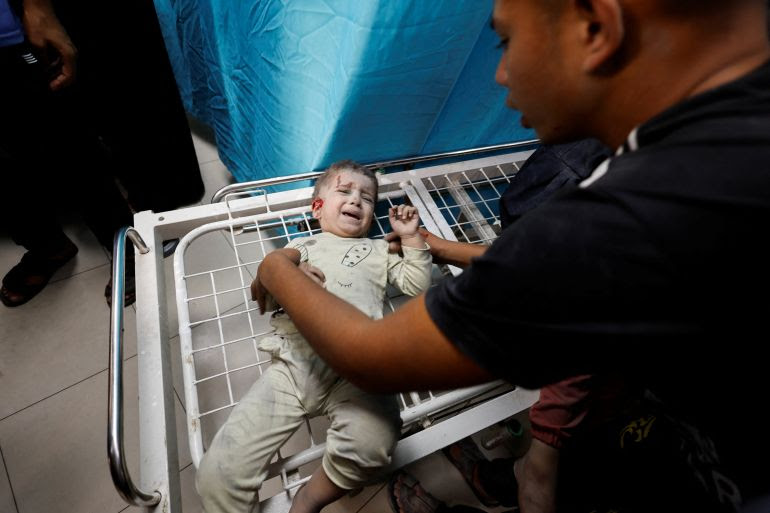
Israel-Hamas war live: Al-Shifa cardiac ward destroyed – Health officials | Israel-Palestine conflict News | Al Jazeera
Patients forcibly evicted from hospitals facing ‘inevitable death’: Minister
Palestinian Minister of Health Mai al-Kaila says Israeli forces “are not evacuating people from hospitals; instead, they are forcibly evicting the wounded and patients onto the streets, leaving them to face inevitable death.
“This is not evacuation but expulsion under the threat of arms,” she said in a press release, as cited by Palestinian WAFA news agency.
“There is a catastrophe unfolding in hospitals, with patients now dying without receiving their treatments, such as children and adults with kidney failure who are perishing at home without undergoing dialysis sessions.”
She said all 3,000 cancer patients who were receiving treatment at al-Rantisi and Turkish hospitals had been abandoned to face imminent death after Israeli forces forcibly evicted them.
Hezbollah claims responsibility for attack on Israel-Lebanon border
Lebanese group Hezbollah has claimed responsibility for the attack on the Israel-Lebanon border we reported earlier.
This exchange of fire comes hours after Israel’s Defence Minister Yoav Gallant visited Israeli soldiers in the north and warned Hezbollah not to provoke Israel at this point.
Communication services to be cut in Gaza by Thursday: Minister
By Thursday, all communications services in Gaza will be cut off due to a lack of fuel, the Palestinian communications minister has said.
Palestinians in Lebanon disappointed that Hezbollah won’t escalate
Mat Nashed Reporting from Sabra and Shatila, Lebanon
A week after a much-anticipated speech about Israel’s assault on Gaza that did not declare war on Israel, Hezbollah reiterated that message on Saturday.
While it would keep retaliating against Israeli attacks on south Lebanon, Hezbollah leader Hassan Nasrallah said, the war with Israel would be long and victory would “take years”.
His message fell short for many Palestinians in Sabra and Shatila, a Palestinian refugee camp that sprawls out across two Beirut neighbourhoods.
“I wanted him to open up the war completely,” said Abdallah*, 25, one of the Palestinians who gathered anxiously at a sidewalk cafe in Sabra and Shatila to watch the speech.
He is one of nearly 250,000 Palestinians languishing in impoverished refugee camps in Lebanon since they were expelled from their homeland during the creation of Israel in 1948.
Read here their full story.
‘Israel has its own agenda’
Reporting from east Jerusalem
The detailed plan for the future of Gaza after the war isn’t clear for the Israelis or the international community.
But what we do know is that Israel’s prime minister in an overnight statement said that they will look to be there for a very long time.
He said that they don’t want Hamas to govern the Gaza Strip but reiterated that Israel’s presence in the strip wouldn’t be an occupation.
Meanwhile, Netanyahu has experienced an international pushback over what has been happening in Gaza. Leaders in Europe and the US have been criticising the number of deaths in Gaza, especially French President Emmanuel Macron who said this bombing has to stop and called for a ceasefire.
But Netanyahu warned that people shouldn’t cave into any pressure from such statements or the protests taking place worldwide and said he will stand firm against the world if necessary.
So according to Netanyahu, Israel has its own agenda and will push through regardless of what other countries say.
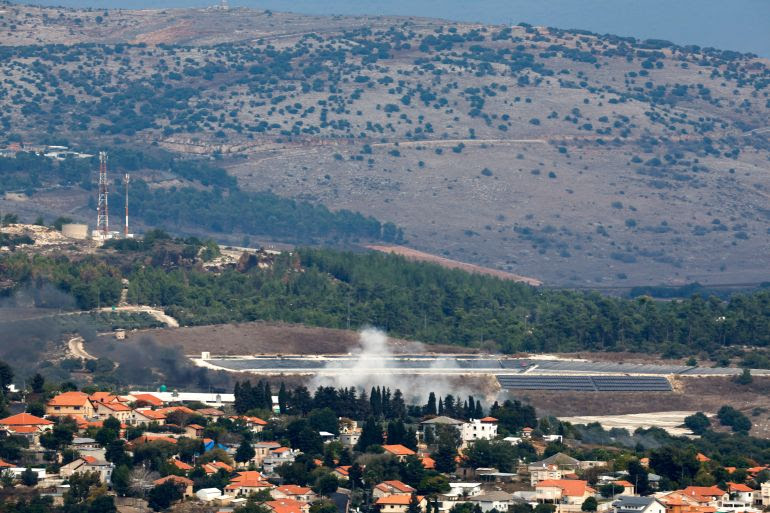
Smoke rises behind the village of Dovev as seen from Israel-Lebanon border in northern Israel, on Sunday
We are getting more information on the civilians wounded in the attack in northern Israel, along its border with Lebanon.
An Israeli ambulance service spokesperson told Israel’s N12 News that one person was critically wounded and between three to five others were injured. Footage showed cars on fire on a road near an open area along the border.
Billionaires are teaming up for pro-Israel, anti-Hamas media drive: Report
A billionaire real estate tycoon in the United States is rallying support for a high-dollar media crusade to boost Israel’s image and demonise the Hamas armed group amid global pro-Palestinian solidarity protests.
The media campaign — called Facts for Peace — is seeking million-dollar donations from dozens of the world’s biggest names in media, finance and technology, according to an email seen by news website Semafor.
More than 50 individuals are being courted, including former Google CEO Eric Schmidt, Dell CEO Michael Dell and financier Michael Milken. They have a combined net worth of around $500bn, Semafor said.
Gaza evacuees arrive in Egypt after Rafah crossing reopens
Four Egyptian security sources told Reuters that a first group of foreigners and injured Palestinians were able to leave Gaza after the Rafah border crossing reopened.
Several injured Palestinians arrived on Egyptian soil to receive medical treatment, plus 80 foreign nationals and dependents, with more undergoing border procedures, the sources said.
Evacuations through the border crossing were suspended on Friday after issues transporting injured Palestinians from northern Gaza.
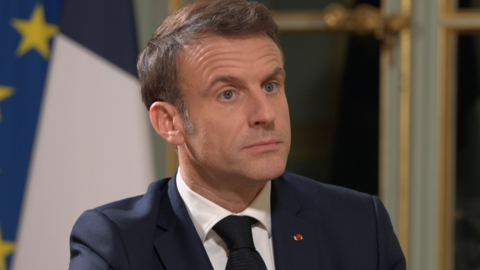
Macron urges Israel to stop bombing babies in Gaza
In an exclusive BBC interview, the French president said a ceasefire would be in Israel's interest.
-
Attribution Europe
-
INL News Investigators are investigating claims that Isreal's Mossad and USA's CIA fund and support Hamas to carry out attacks on Israel who knew the 7th October 2023 on Israel was coming and thus allowed the Hamas Rockets to bypass Israel's normally impenatrable Security
An alternative to the Suez Canal is central to Israel’s genocide of the Palestinians – Middle East Monitor
News Investigators are investigating claims that Isreal's Mossad and USA's CIA fund and support Hamas to carry out attacks on Israel who knew the 7th October 2023 on Israel was coming and thus allowed the Hamas Rockets to bypass Israel's normally impenatrable Security
An alternative to the Suez Canal is central to Israel’s genocide of the Palestinians – Middle East Monitor
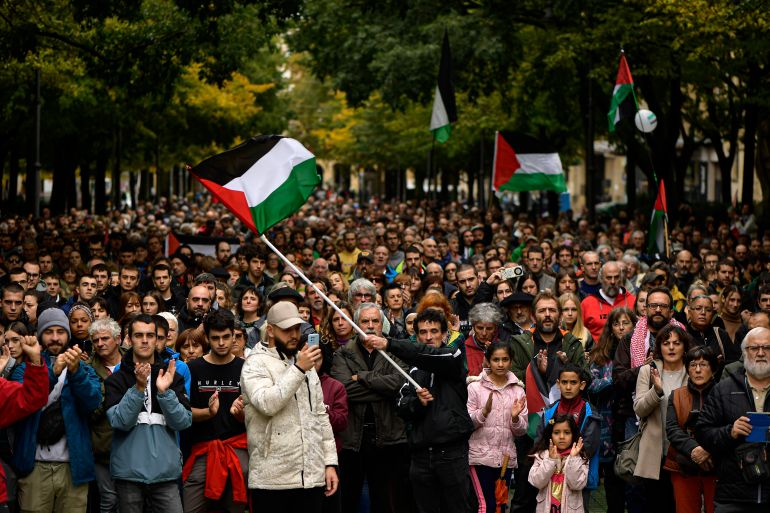
- Demonstrators wave Palestinian flags as they protest in Pamplona, northern Spain
-
US not utilising leverage over Israel ‘effectively’: Analyst
-
The future of Palestine: two-state solution more distant that ever
Sahar Khamis, a professor at the University of Maryland, says there has been growing sentiment in the US to save the lives of innocent civilians in Gaza.
“Atrocities” being committed by Israeli forces are now available for everyone to see on social media, she noted.
But despite growing pressure, the Biden administration has not responded in a way that is “firm, decisive, strong, or satisfactory to meet these demands”, Khamis said.
While the US has leverage over Israel, it is not being used “sufficiently or productively” to put an end to Israel’s attacks, she added.
Her comments come as diplomats in the US State Department have been criticising US policy on the war on Gaza.

Smoke rises as buildings in Gaza’s Beit Hanoun are bombed
They're Killing Children In Gaza
The Song
Written and Recorded by the INL News Group
Verse One
The Israel Gaza War... Why is it happening ..
The Israel Gaza War...
supported by the major Western Powers..
Verse Two
All the Palestinians are having to flee from their homes
Before the Israelites drop more bombs and rockets on Gaza
All the sick are having to be moved from Gaza Hospitals
Before another Israel Rocket hits their beds..
Chorus
They're killing women and children.. In Broad Daylight..
They're killing women and children who are not even in the fight...
Live updates | Israeli tanks and soldiers search Gaza’s Shifa Hospital compound
Israel-Hamas war: Live updates and latest news | AP News
The Israeli military has released footage that it said shows joint operational activity of two army brigades in its advancement on the ground in Gaza Strip. (Nov.15)
Two and a half weeks after sending tanks and ground troops into northern Gaza, Israeli forces searched a hospital Wednesday where they claim Hamas militants operate. Mohammed Zaqout, the director of hospitals in Gaza, said Israeli tanks were inside the medical compound and that soldiers had entered buildings, including the emergency and surgery departments, which house intensive care units.
Shifa Hospital has become a symbol of the widespread suffering of Palestinian civilians during the war between Israel and Hamas, which erupted after the militant group killed some 1,200 people and seized around 240 captives in a surprise Oct. 7 attack into southern Israel.
The Israeli army claims the militant group uses hospitals as cover for its fighters, and has set up its main command center in and beneath Shifa Hospital, the largest in the besieged territory. Both Hamas and Shifa Hospital staff deny the Israeli allegations.
Tens of thousands of supporters of Israel rally in Washington, crying ‘never again’
Israel march: Tens of thousands of supporters rally in DC | AP News
Supporters of Israel have rallied by the tens of thousands on Washington’s National Mall, voicing solidarity in the fight against Hamas and crying “never again.” (Nov. 14)
WASHINGTON (AP) — Supporters of Israel rallied by the tens of thousands on the National Mall under heavy security Tuesday, voicing solidarity in the fight against Hamas and crying “never again.”
The “March for Israel” offered a resounding and bipartisan endorsement of one of America’s closest allies as criticism has intensified over Israel’s offensive in Gaza, set off by the bloody Hamas incursion on Oct. 7.
Overlooking a sea of Israeli and U.S. flags, the top Democrats in Congress — Senate Majority Leader Chuck Schumer and House Democratic leader Hakeem Jefferies — came together on the stage with Republicans Mike Johnson, the House speaker, and Sen. Joni Ernst of Iowa. They joined hands as Schumer chanted, “We stand with Israel.”
Yet underneath that projection of unity, Democrats are sharply divided over Israel’s course and its treatment of Palestinians. President Joe Biden now is urging Israel to restrain some of its tactics to ease civilian suffering in Gaza after voicing full-throated solidarity with the Israelis in the war’s early weeks.
Two premature babies die in al-Shifa Hospital: Director
Al-Shifa Hospital director Mohammed Abu Salmiya says two prematurely born babies died because of the power outage there.
“They were 39 children and now they’re 37 newborns,” Abu Salmiya told Al Jazeera.
The babies, who require oxygen devices, were moved from incubators to a bed in another part of the hospital that is “not conducive to newborns”.
“We’ve placed 10 prematurely born babies on one bed because these children need a particular temperature, they need particular respirators and ventilators, and particular nutrition,” he added.
These babies weigh somewhere between 800 to 2,000 grams (1.7 – 4.4 pounds), according to Abu Salmiya. He said doctors are struggling to save their lives and are now using “primitive methods”, but that this is “very unsustainable”.
Abu Salmiya said the Israeli army has ignored requests to transfer the newborns out of al-Shifa to a safe location.

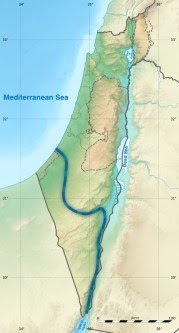
|
Gaza being exterminated to make way for lucrative Ben Gurion canal that will cut across Israel to the Red Sea Natural News Report and Podcast Mike Adam |
|
|
A competitor to the Suez Canal is being planned to cut across Israel and connect the Mediterranean Sea with the Red Sea. This canal would give the U.S. and Israel control over a key chokepoint in the world for military ships, grain exports, energy and other commodities. The planned route of the canal goes right through northern Gaza, and many analysts believe that Gaza is being destroyed and wiped out right now to make way for the construction of this canal, which would bring in billions of dollars a year for Israel (and grant Israel control over its access). |
|
An alternative to the Suez Canal is central to Israel’s genocide of the Palestinians
![A "Welcome to Egypt" sign can be seen across the Suez Canal on 30 March 2021 in Ismailia, Egypt. [Mahmoud Khaled/Getty Images]](https://ci6.googleusercontent.com/proxy/AhhhcCK57L-cXqFoFCnEQRbpJRVWu8nuDtZL_KHLITg82P5deqONgBG4ZAH3gTrWE41UHImF1RZVffbrb4pkKssiKcHPhwkw-FP8pIskxyCeQS0MWalh7d1d9DnQXcJFW3qmhYmTPqIIk0kM7OgL_R-7QX5nSvtFLJ43eXdLzMJz9vaBIa0RfTsG6eCrbs5trkF4s8AX44MPHnlLDg2A2wdTZhUxLVO1sen7LiA=s0-d-e1-ft#https://i0-wp-com.cdn.ampproject.org/i/s/i0.wp.com/www.middleeastmonitor.com/wp-content/uploads/2021/04/GettyImages-1232019401-1.jpg?fit=1200%2C800&ssl=1)
I hate conspiracy theories and fake news. They degrade my profession as a journalist and incite fear, hate and tribulation with the deliberate intention of causing a public backlash. Naturally, there have been all sorts of speculation and rumour around the war in Gaza and the 7 October surprise Hamas attack on the occupation state.
It has been said that the attack was two years in the planning in Gaza, a tiny patch of land riddled with Zionist infiltrators and spies who cajole, bribe and threaten ordinary Palestinians to betray their comrades.
So the question many are asking, with some justification, is why there was such a catastrophic intelligence failure which meant that the attack caught the Israeli military sleeping on the job. In terms of access to eavesdropping technology and defence there is probably no better-equipped military in the world other than in the US, and the Americans maintain secret supply bases in the Zionist state. Israel’s Mossad has earned itself a reputation of being among the finest intelligence gatherers and infiltrators in the world. And yet 7 October saw Hamas fighters breach security fences, invade a music festival and local kibbutzim, and fly in on paragliders without a single challenge. How did this happen?
Some of Israel’s most brutal attacks on innocent Palestinians are made citing “national security” and Israel’s alleged right to defend itself. If it was being attacked by another nation state, fair enough. But an attack by people living under Israel’s brutal military occupation provides no such legal defence. It doesn’t exist.
READ: 41 children killed in West Bank since 7 October, charity says
A good contact and friend of mine who watches the region’s events closely told me simply: “Follow the money.” And that is how, after being nudged and pointed in a variety of directions with annoyingly vague clues, I found myself pouring over a network of paper trails that led to the National Archives, where British secrets lie unseen for at least 30 years and in some cases much, much longer.
By the time they surface, it’s usually far too late to do anything as the guilty have taken their secrets to the grave, but some disclosures do explain the terrible behaviour of governments and rogue politicians. Many of my colleagues are waiting with bated breath for the March 2030 deadline to pass to find out how the Iraq war came about, and if our suspicions about former British Prime Minister Tony Blair’s role are as bad as we believe.

The Ben Gurion Canal Project
This particular paper chase, though, took me to the origins of the Suez Canal, which opened with a grand ceremony on 17 November 1869, 154 years ago this month. Today, 10 per cent of the world’s cargo ships sail through this strategic route between the Eastern Mediterranean and the Red Sea, heading to and from the Indian Ocean and connecting Europe and Asia.
Egypt owns, controls and operates the canal now, but it was once owned by French investors who held half of the canal company’s stock with Egypt’s ruler Sa’id Pasha holding most of the balance. In 1875, a cash crisis forced Sa’id’s successor, Isma’il Pasha, to sell the country’s shares to Britain. The Suez Company operated the canal until Egypt’s President Gamal Abdel Nasser tore up the concession in 1956 and transferred the canal’s operation to the state-owned Suez Canal Authority. There then followed the Suez Crisis, also known as the second Arab-Israeli war.
On the same day that the canal was nationalised Nasser also closed the Straits of Tiran to all Israeli ships. The crisis saw the UK, France, and Israel invade Egypt. According to pre-agreed plans prepared by Britain and France, Israel invaded Egypt’s Sinai Peninsula on 29 October 1956, forcing the Egyptians to engage its troops. This gave the excuse for the Anglo-French alliance to declare the fighting to be a threat to stability in the Middle East and enter the war, officially to separate the two forces but, in reality, to regain control of the Suez Canal and bring down the Nasser government.
What does it have to do with 7 October 2023? Well, it just so happens that Gaza is slap bang in the middle of the proposed path of a major second canal in the region.
READ: Only 27% of Israelis believe Netanyahu is suitable to head government
Gaza is currently being bombed to oblivion by the deranged Israeli leader Benjamin Netanyahu who wants to deliver The Ben Gurion Canal Project. Yes, Tel Aviv already has a name for the canal which was first proposed back in the Sixties. It would connect the Gulf of Aqaba on the Red Sea to the Mediterranean Sea, and would even be named after the first prime minister of Israel.
The canal would rival Egypt’s Suez Canal, causing a major financial threat to the country and this major trade artery. Remember the global trade disaster caused the huge container ship Ever Given got stuck in the famous canal in 2021? The Straits of Tiran and Suez Canal remained formally closed to Israeli vessels from the creation of Israel in 1948 and the Nakba until the Suez Crisis in 1956. When all land trade routes were blocked by Arab states, Israel’s ability to trade with East Africa and Asia, mainly to import oil from the Persian Gulf, was severely hampered. There have been other obstructions involving Israel forcing its closure in 1956-7 and 1967-75.
If it goes ahead, this new canal will be almost one-third longer than the 193.3 km Suez Canal, at around 292.9 km and an estimated cost of between $16 and $55 billion. Whoever controls the canal will have enormous influence over the global supply routes for oil, grain and shipping. With Gaza razed to the ground, it would enable the canal planners to literally cut corners and reduce costs by diverting the canal straight through the middle of the territory.
Around 12 per cent of the world’s trade passes through Suez on 18,000 ships a year, so you can imagine that a lot of countries will be lining up for a share of the deal. The Suez Canal is worth a staggering $9.4 billion to Egypt, which has enjoyed record-breaking revenues this year.
The only thing stopping the newly-revised project from being revived and rubber-stamped is the presence of the Palestinians in Gaza. As far as Netanyahu is concerned they are standing in the way of the project; a project which may earn him forgiveness in Tel Aviv for the intelligence and military shortcomings on 7 October. However, his treacherous sleight of hand will never by forgiven or forgotten by the people of Palestine given the horrors which have descended upon Gaza in the past few weeks.
READ: No evidence of Hamas seizing aid entering Gaza: US envoy
If this is all being done in the name of potential business deals then it compounds the political and diplomatic disgrace of the shameless Western governments who are complicit in the Palestinian genocide.
The biggest shame, though, belongs to Egypt. Already on the verge of bankruptcy due to President Abdel Fattah Al-Sisi’s profligacy, the emergence of a new canal would have a devastating impact on the Egyptian economy and its people. Heartless dictator Al-Sisi may come to regret putting his trust in Tel Aviv and Western governments above the interests and welfare of two million Palestinians in Gaza.
None of the Middle East leaders, Netanyahu, Biden and Sunak et al in the West emerge from the carnage in Gaza with any degree of integrity intact. Together, they are guilty of war crimes and crimes against humanity, or at the very least are complicit in such awful crimes leading to genocide.
This didn’t all begin on 7 October; the bombing of Gaza is simply the latest stage of Israel’s slow genocide of the people of Palestine, which has now got up to speed again with the full backing of the Western sponsors of the apartheid state. If they think that killing innocent children and women will bring peace, they are deluded.
Unbridled neoliberal capitalism has destroyed many countries and killed millions of people, and peace and security have rarely been the result. I hope that the evil people responsible will burn in Hell for what they have done to the children of Palestine, Iraq, Afghanistan, Libya, Syria and numerous other countries around the world. The survivors need freedom and justice now.
OPINION: Like the fabled phoenix, Gaza will rise from the ashes
The views expressed in this article belong to the author and do not necessarily reflect the editorial policy of Middle East Monitor.
‘Don’t make the mistake’: Netanyahu warns Hezbollah
Israel’s leader issued a stark warning to Lebanon’s Hezbollah after the defence minister did the same earlier in the day.
“Don’t make the mistake of going to war. That would be the mistake of your life… Your entry into the war will seal the fate of Lebanon,” Benjamin Netanyahu said.
Hezbollah leader Nasrallah earlier said the armed group used new types of weapons and struck new targets in Israel, and pledged the front against Israeli would “remain active”.
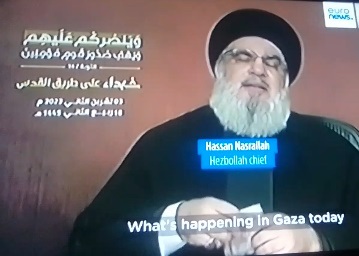
" What is happening in Gaza today is not like any other previous war...
Israel Gaza Conflict Euro News 7th November 2023 P1A
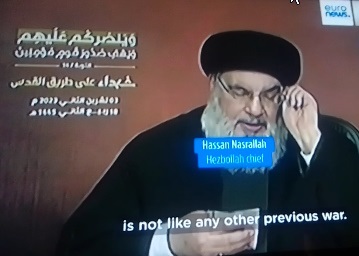
... is not like any other previous war...
Israel-Hamas War - Hezbollah Leader Threatens All-Out War
Israel Gaza Conflict Euro News 7th November 2023 P1b
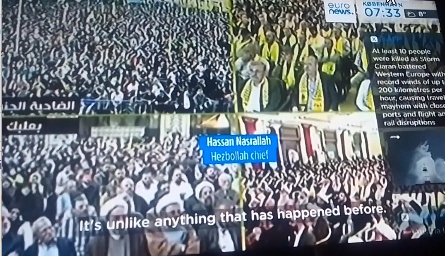
... it's unlike anything that has happened before..
Israel Gaza Conflict Euro News 7th November 2023 P2
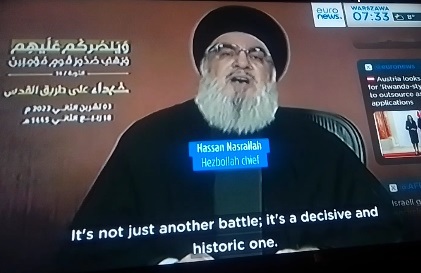
.... It's not just another battle ... it's a decisive and historic one...
Israel Gaza Conflict Euro News 7th November 2023 P3
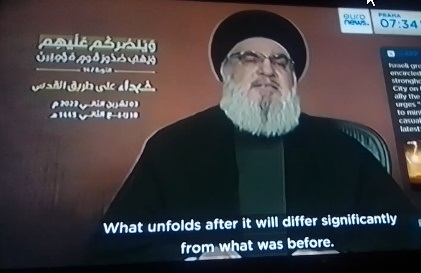
.. What unfolds after it will differ significantly from what was before..
Israel Gaza Conflict Euro News 7th November 2023 P4
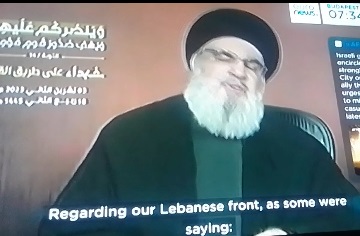
"Regarding our Lebonese front, as some were saying:
IsraelGazaConflictEuroNews7thNovember2023_P5
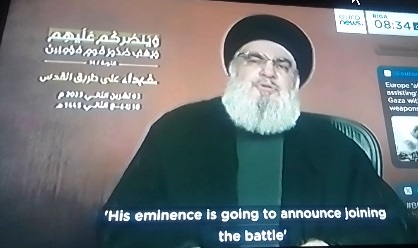
.. 'His eminence is going to announce joining the battle ....
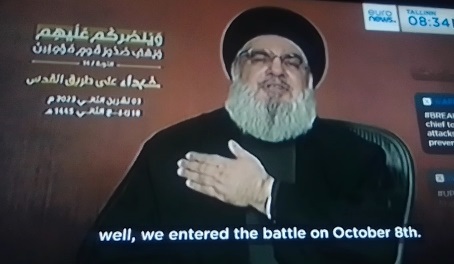
well we entered the battle on October 8th 2023.'
Israel Gaza Conflict Euro News 7th November 2023 P6
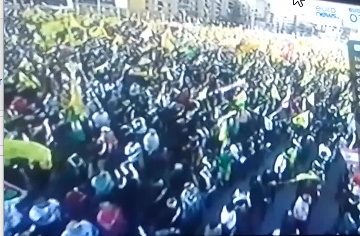
IsraelGazaConflictEuroNews7thNovember2023_P6A
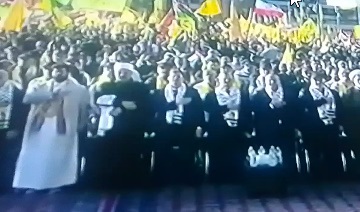
IsraelGazaConflictEuroNews7thNovember2023_P6B
Fierce fighting in Gaza as US says Palestinians must govern Gaza post-war
Fierce fighting in Gaza as US says Palestinians must govern Gaza post-war (msn.com)
Israeli forces battled Hamas militants through shell-blasted buildings in Gaza City on Thursday as some 80 countries and organisations met in Paris to coordinate humanitarian aid and find ways to help wounded civilians escape the siege.
Residents in Gaza City said Israeli were fighting Hamas and other militants and that tanks were stationed around the city. They said Israeli forces were moving closer to two hospitals where thousands of displaced Palestinians were seeking shelter.
The Israeli military said its troops had advanced into the heart of Gaza City, Hamas' main bastion and the biggest city in the Palestinian coastal enclave, while the Islamist group said its fighters had inflicted heavy losses.
Hamas' armed wing on Wednesday released a video that appeared to show intense street battles alongside bombed out buildings in Gaza City.
Israeli tanks have met heavy resistance from Hamas fighters using underground tunnels to stage ambushes, according to sources with Iran-backed Hamas and the separate Islamic Jihad militant group.
As the Israel-Hamas war enters its second month, the United States said when the war does end Palestinians must govern Gaza.
U.S. Secretary of State Antony Blinken on Wednesday outlined Washington's red lines and expectations for the besieged coastal territory, pushing back at Israeli comments that it would be responsible for security in Gaza indefinitely.
There should be "no reoccupation of Gaza after the conflict ends. No attempt to blockade or besiege Gaza. No reduction in the territory of Gaza," Blinken said at a press conference in Tokyo.
While Blinken said there may be a need for "some transition period" at the end of the conflict, but that post-crisis governance in Gaza must include Palestinian voices.
"It must include Palestinian-led governance and Gaza unified with the West Bank under the Palestinian Authority."
The Palestinian Authority (PA), which exercises limited self-rule in parts of the Israeli-occupied West Bank, says the Gaza Strip, where Hamas has ruled since 2007, is an integral part of what it envisions for a future Palestinian state.
Israeli officials have clarified they do not intend to occupy Gaza after the war, but they have yet to articulate how they might ensure security without maintaining a military presence. Israel withdrew its forces from Gaza in 2005.
Israel launched its military assault on Gaza in response to a cross-border Hamas raid on southern Israel on Oct. 7 in which gunmen killed 1,400 people, mostly civilians, and took about 240 hostages, according to Israeli tallies.
Palestinian officials said 10,569 people had been killed as of Wednesday, 40% of them children. Israel says 33 of its soldiers have been killed.
SEA LANES FOR AID AND WOUNDED
A conference in Paris on Thursday, attended by Arab nations, Western powers, G20 members and NGO groups such as Doctors Without Borders will discuss measures to alleviate the suffering in Gaza, but without a pause in fighting expectations are low.
"The object is really to work with all the participants and also with Israel ... to allow improved access," a French presidential official told reporters ahead of the conference
Among the options discussed will be setting up a maritime corridor to use sea lanes to ship humanitarian aid into Gaza and see how ships could be used to help evacuate the wounded.
Thousands of Palestinian civilians trudged in a forlorn procession out of the north of Gaza on Wednesday seeking refuge from Israeli air strikes and fierce ground fighting between Israeli troops and Hamas militants.
The exodus took place during a four-hour window announced by Israel, which has told residents to evacuate encircled northern parts of Gaza or risk being trapped in the violence. But the central and southern parts of the enclave also came under fire again.
Huge numbers of displaced people from among Gaza's 2.3 million population are already crammed into schools, hospitals and other sites in the south.
Thousands of others remain in the north, including at Gaza City's main Al Shifa hospital.
Israel has blamed Hamas for civilian deaths in Gaza, saying that it is using them as human shields and hiding arms and operations centres in residential areas.
"As deaths and injuries in Gaza continue to rise due to intensified hostilities, intense overcrowding and disrupted health, water, and sanitation systems pose an added danger: the rapid spread of infectious diseases," the World Health Organization warned on Wednesday.
WHO said that more than 33,551 cases of diarrhoea had been reported since mid-October, the bulk of which was among children aged under five.
Macron calls on Israel to stop killing Gaza's women and babies
Macron calls on Israel to stop killing Gaza's women and babies - BBC News

France's President Macron urges Israel to stop killing Gaza's women and children
The end of Gaza's most beautiful neighbourhood (bbc.co.uk)
By Alice Cuddy | BBC News, Jerusalem
Around noon on Friday 20 October, the residents of the upscale Gazan neighbourhood of al-Zahra stood in front of the rubble and dust that used to be their homes.
Fridays were supposed to be special: the Islamic day of prayer marks the start of the weekend and in al-Zahra it meant falafel and hummus, coffee and tea, all served in spacious family apartments or villas by the Mediterranean Sea. Residents here knew they were luckier than most in Gaza.
But overnight, Israeli bombs had flattened 25 apartment blocks, home to many hundreds of people. Israel had been bombing Gaza for days in response to the Hamas attacks of 7 October, but al-Zahra had not been hit until now.
Some of those who lived here - among them doctors, lawyers, academics, fashion designers and entrepreneurs - tried to stay and survive in the ruins, but most packed up what little they could salvage and dispersed across the Gaza Strip.
Hana Hussen, who grew up in al-Zahra, followed the news with horror from hundreds of miles away in Turkey, where she had moved two years ago. In a hurried phone call that day, she rang her family to check they were safe.
She told them she loved them.
Then the line went dead.
OVERNIGHT, ISRAELI BOMBS HAD FLATTENED 25 APARTMENT BLOCKS, HOME TO MANY HUNDREDS OF PEOPLE.
The residents of the destroyed apartment blocks had been sheltering from the bombs in a nearby university thanks to the efforts of local dentist Mahmoud Shaheen who led a mass evacuation of his neighbours. The BBC told the story earlier this week of how he received a dawn phone call from an Israeli intelligence agent warning him that the blocks would be bombed.
The Israel Defense Forces (IDF) told us it was “unable to answer specific operative questions” when asked about its decision to strike al-Zahra’s residential blocks. Hamas was attacking Israel from across the Gaza Strip and had “embedded itself in civilian infrastructure”, it added. It has not named any Hamas operative killed in the strikes on al-Zahra, and it is believed that nobody died.
Israel says its strategy has been to root out Hamas which it accuses of operating in the heart of civilian communities - and that it takes steps to mitigate civilian casualties, such as the phone call we reported Mahmoud had received instructing him to evacuate the neighbourhood.
The agent who had called the dentist also told him: “We see things you do not see.”
Mahmoud’s neighbours may have escaped alive but they did not all survive what was to come.
The BBC has spent two weeks talking to several families from the area, both established residents as well as younger, ambitious newcomers.
They told us about how they had grabbed whatever they could from their homes, watched those homes explode in front of their eyes, and then dispersed around Gaza to an uncertain fate. From makeshift shelters and temporary homes across the strip, residents wanted to tell the story of the life and demise of a neighbourhood they loved.
Our communications have been over broken calls - sometimes with bombs sounding in the background - and sporadic WhatsApp messages. People cut conversations short to run or seek shelter. In some cases, we have lost contact for days at a time.
After a recent communications blackout during intense Israeli strikes on the strip, one al-Zahra resident eventually left a short message: “Thank you for asking. We are still alive.”
Our conversations show that not everyone who left al-Zahra survived. Among those reported killed are a young body-builder from a local gym whose last words to a friend, according to social media posts, were: “It’s all gone.”
The Hamas-run health ministry says more than 10,000 Palestinians have been killed in Gaza since the start of the war, over a third of them children.
The Gaza Strip is densely populated with high levels of poverty and tight controls on entering and leaving. But al-Zahra was a neighbourhood of large homes and bright outdoor spaces, of groves with almonds and figs, of sports grounds and parks.
Al-Zahra was established in the 1990s by the late Palestinian Authority (PA) President Yasser Arafat as a place for staff and supporters. Locals say it still had strong connections with the PA, which is based in the occupied West Bank and is a bitter rival of Hamas.
It sits just north of the Wadi Gaza river - a point that Israel ordered civilians to move south of on 13 October. This followed days of bombing, Israel’s response to hundreds of Hamas gunmen rampaging across the border killing more than 1,400 people, mostly civilians including many children, and taking more than 200 hostages. The brutality of the attacks in southern Israeli villages and the massacre of young people gathering at a music festival has traumatised the nation.
Everyone we spoke to insisted that, to their knowledge, this area was as far removed from Hamas and its operations as it is possible to be in Gaza, which Hamas has ruled since 2007. “There was no military here,” one told us. “I don’t even think there were Hamas supporters living here.”
For Nashwa Rezeq, who had lived in al-Zahra for 18 years, it was the “greatest city of all”.
Heavily involved in neighbourhood committees and a local youth council, Nashwa has also been one of the keepers of a community Facebook group for more than a decade. If you ask her about a particular resident, she is likely to know them and perhaps even their phone number.
The Facebook page has about 10,000 followers. On the eve of the war there were posts about a billiards tournament at a local cafe and a message of congratulations to a graduating student.
Now the Facebook group is where they share updates on the destruction of their neighbourhood and mark the deaths of those who lived there. It has never before kept Nashwa this busy.
A recent post mourns a family killed in a strike that hit their Italian restaurant.
When war was declared, Nashwa headed south with her husband and four children, as the family always did during escalations. She gave her neighbour a key, asking them to tend her beloved house plants while she was gone.
Two days after the first bombings, her own building - the tallest in al-Zahra - was destroyed at dawn.
“Somebody called me and said ‘I just walked by your tower and it’s all on the ground’,” she recalls.
She describes her fifth-floor home as being “very big and spacious”. Her family bought it and improved it over the course of a decade - they had recently bought a new air conditioning unit, a television and furniture.
“A lot of people say it’s only money, but to me my home was my soul.”
Now in southern Gaza, she says her family are still in danger. “Three days ago, they bombed the house next to us. The smoke from that bombing suffocated us.”
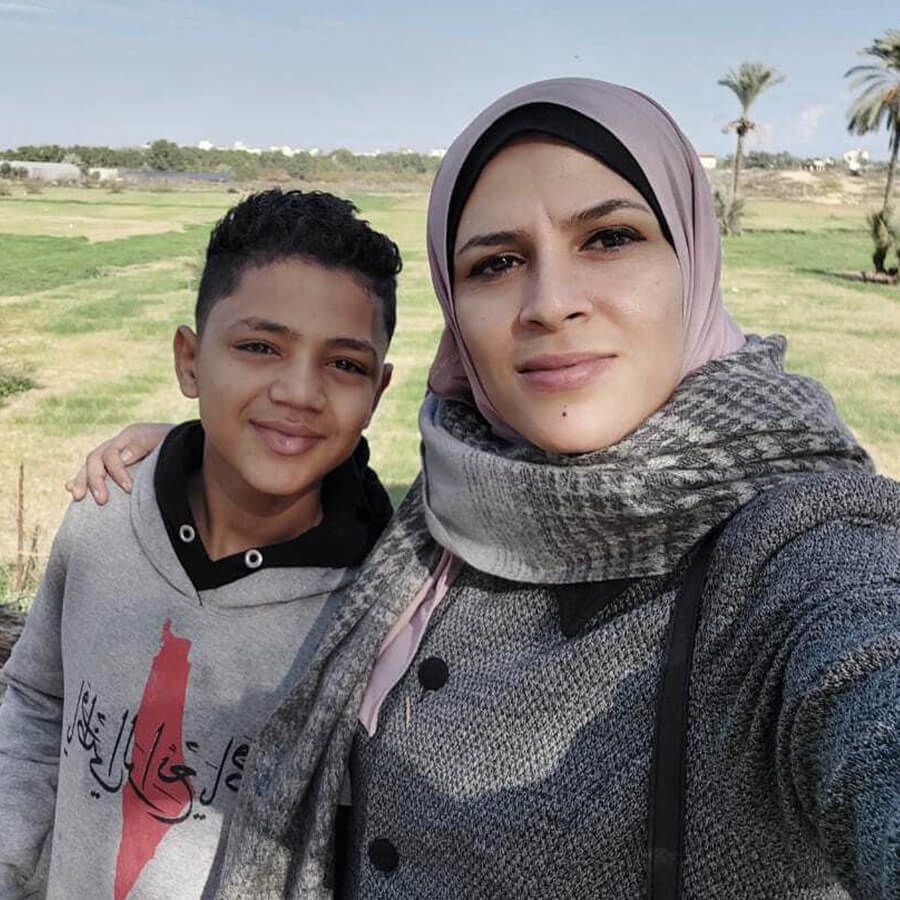
Nashwa Rezeq with her son
“A LOT OF PEOPLE SAY IT’S ONLY MONEY, BUT TO ME MY HOME WAS MY SOUL.”
Her children keep asking why they couldn’t have brought the new air conditioning unit and television with them when they fled al-Zahra. They also keep asking when they can go home and collect their toys.
For Nashwa, it’s her houseplants: “I loved all of them.”
University professor Ahmed Hammad, who lived in a building close to Nashwa, was another established member of this community. He was one of those who chose to stay after the strikes.
A media and communications professor in his 50s at a university to the north of the neighbourhood, Ahmed is eager to send his research papers to us and talks proudly about his six children, aged eight to 27.
“One of them is a dentist, one of them works in IT, one of them studied English literature at university. The other three are still at school,” he says.
When we spoke on the phone last month, Ahmed and his family were sheltering at their al-Zahra home, now without doors or windows. No longer able to go to work or school, they spent their time searching for wood to burn so they could cook. They stayed as they were too frightened to evacuate, worrying that they would be caught in strikes while moving south.
But on the night of 27 October, Israel intensified air strikes and expanded its ground operations - and we lost contact with Ahmed. Days later, he got in touch to say they had left their neighbourhood after a “very, very tough night” and even worse morning.
He describes dodging “continuous bombing” on the journey south.
“Every time a bomb landed, we lay on the ground.”
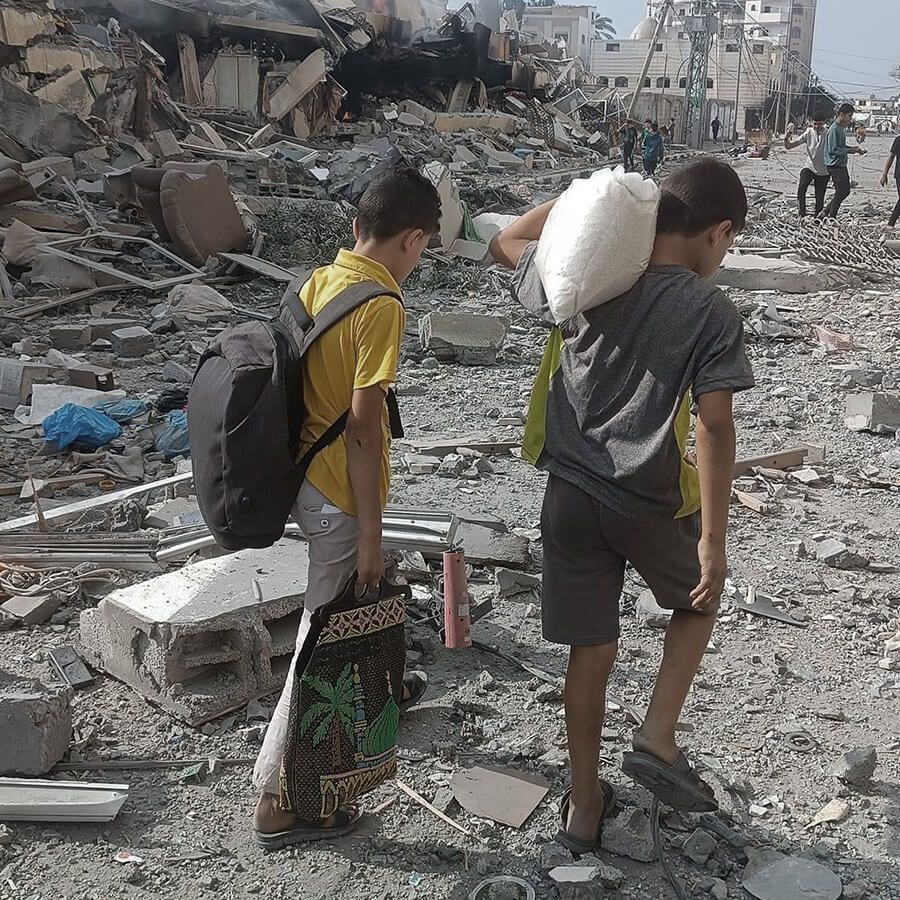
HE DESCRIBES DODGING CONTINUOUS BOMBING ON THE JOURNEY SOUTH.
Back in Turkey, Hana stayed glued to her phone waiting for an update from her family.
As she waited, she told us stories about what she called “the most beautiful, warmest place in the world”.
Residents of al-Zahra congregated on the beach and filled the main street leading there at sunrise and sunset. On Fridays, Hana and her friends would go there to share jokes and stories from the week, she says.
In a sign of how much the war changed life here, Hana says that she started receiving “haunting” messages from those same friends - one asking if Hana would look after her children if she died, others asking for advice on “alternative options for feminine hygiene products”. Another wished they had clean water to drink.
After many days of waiting, Hana finally made contact with her family, including her brother Yahya, who she describes as her soulmate.
Yahya was among a new generation of entrepreneurs in al-Zahra. The 30-year-old fashion designer prefers to talk about his former life instead of his current overcrowded accommodation just south of the neighbourhood, where he walked with his family over several hours after their home was destroyed.
He remembers the sound of birds as he looked out over the neighbourhood from the roof of his family’s apartment building.
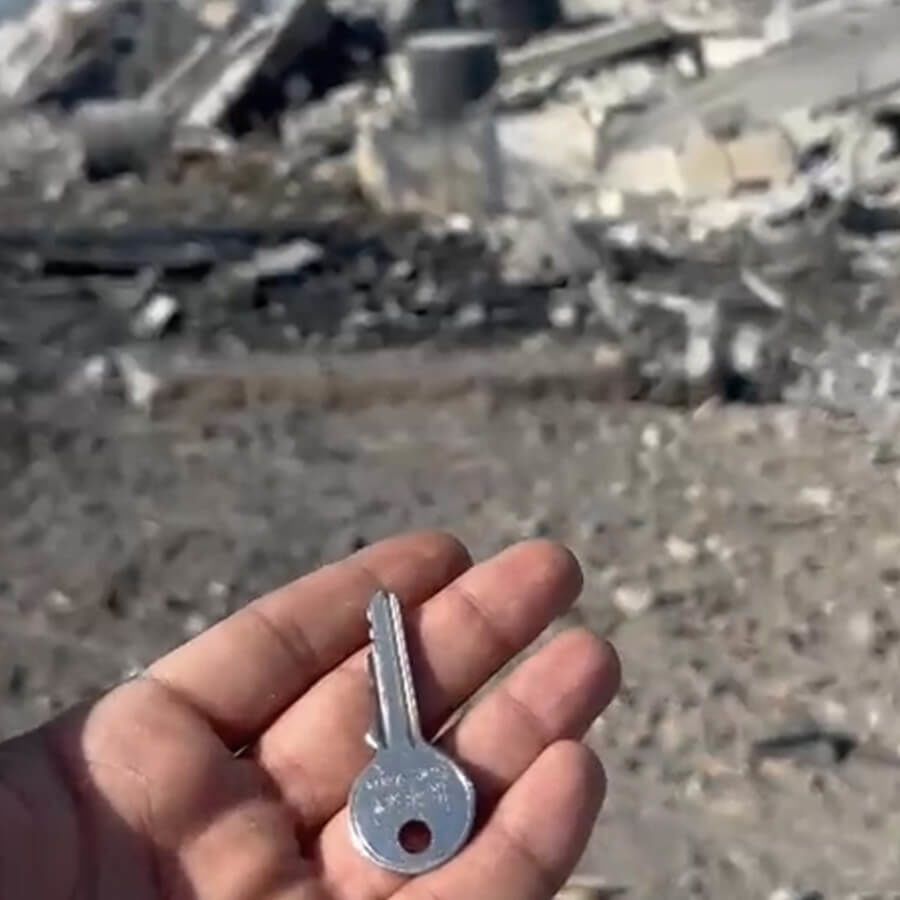
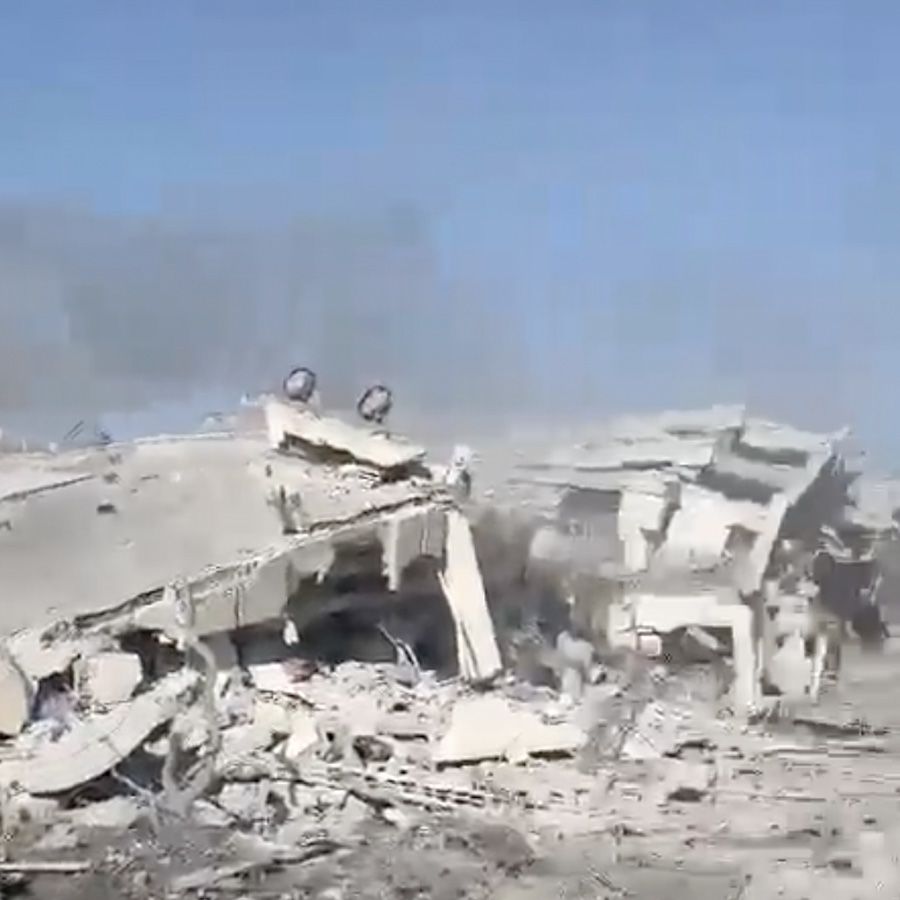
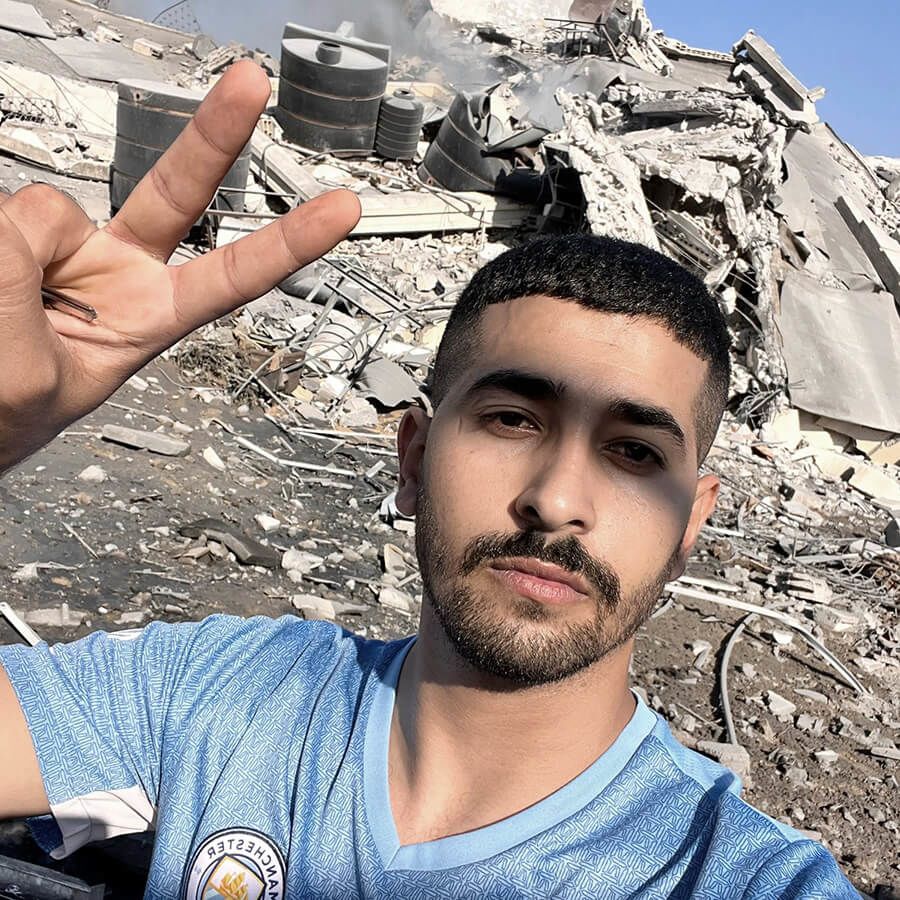
“OUR HOME IS THE STREET NOW. EVERYTHING WAS DESTROYED.”
People often posted videos from al-Zahra’s rooftops. Some show spectacular colours as the sun set.
“All those things made us feel delighted,” Yahya says via WhatsApp.
Listing some of his favourite things about his neighbourhood, Yahya writes in a string of messages: “The lights at night. The sea. It’s a peaceful and elegant city.”
Now, he sometimes ends WhatsApp conversations abruptly. “Can I go now because ther [sic] bomb near of me,” he says in one message.
He left al-Zahra with two bags containing an iPad, documents, a hoodie, a water bottle, his passport, chocolate, and a first aid kit. He was forced to leave his intricately crafted designs - his fabrics, dresses and skirts - behind.
Cousins Ali and Mohamed, 25, are also young entrepreneurs in the city, and had busy jobs in al-Zahra as a pastry chef and cafe owner respectively. Both lived in the row of buildings destroyed on 19 and 20 October.
They had invested a lot of money in building a life there. Ali got married earlier this year, and spent $6,000 on new furniture that was being kept at the family home, where he and his pregnant wife were staying.
His family moved here from Gaza City during the 2014 war between Hamas and Israel, thinking it was “the safest place“ to be.
Last month they prepared bags with two sets of clothing in, ready to grab if they needed to flee. “One bag for my mum, one bag for my brother, one bag for my wife,” he says.
On 19 October, the family picked up those bags and left everything else behind. When bombs hit their building, Ali says all of the losses were doubled - he and his wife’s new furniture was destroyed alongside his parents’ possessions. Two fridges, two washing machines, two sofas.
Mohamed says his dad had only recently made the final payment on their home, when they too evacuated that night. “He finished the payment for the flat and now the flat is gone,” he says.
He now spends his days looking for water: “There is no time to rest.”
He misses the cafe he ran on the grounds of the university, with its pool table and painting of US rapper Tupac Shakur on the wall. He misses going to the gym every day. But mostly he misses his friends. “We’d be joking, laughing. We’d sit together until midnight.”
Journalist Abdullah al-Khatib says his extended family also lost four homes in the strikes.
He says his son keeps asking when he’ll be able to go home and play with his friends in the park. But he may never be able to return.
“Our home is the street now. Everything was destroyed,” he says.
Mahmoud, the dentist who took the evacuation call, is now volunteering at a medical centre in central Gaza.
“I smell the most horrible smells. You are not washing and there are 130 people with you,” he says.
Mahmoud says he feels fortunate to have enough money for the inflated prices of everyday items. One of Mahmoud’s close friends has remained in a villa in al-Zahra, and the dentist recently sent flour to him so he could make bread.
But those same items are in increasingly short supply.
“Today I went to all the shops looking for lentils… and I don’t want to exaggerate, I entered at least 40 shops to ask for lentils and I couldn’t find any,” he says. “One shopkeeper told me, ‘Don’t waste your time.’”
Mahmoud says he hopes to go back to al-Zahra after the war is over. “I hope God will let us survive and then we will try to fix things.”
The IDF says Hamas continues to operate from across the Gaza Strip. It added: “As part of the IDF's mission to dismantle the Hamas terrorist organisation, the IDF has been targeting military targets across the Gaza Strip. Strikes on military targets are subject to relevant provisions of international law, including the taking of feasible precautions to mitigate civilian casualties.”
Hana last went to al-Zahra five months ago, not knowing it would be the last time she would see her home.
“If I had known, I would have… bade farewell to the walls of my room, which I love, and which have witnessed moments of joy and sorrow in my life.
“I would have taken many of my belongings that carry memories of dear moments,” she says.
“They left us with nothing. Absolutely nothing.”
“THEY LEFT US WITH NOTHING. ABSOLUTELY NOTHING.
More on Israel-Gaza war
- From Israel: Pain still raw a month after Hamas attacks
- Kibbutz Be’eri: Hamas attack captured by mothers’ WhatsApp group
- Watch: The devastating effects of war on Gaza’s children
- More on al-Zahra: Gazan tells BBC about most terrifying call of his life
- Explained: Who are the hostages taken by Hamas from Israel?
- History behind the story: The Israel-Palestinian conflict
Yemen’s Houthis launched strikes at Israel during the war | AP News
https://apnews.com/article/
Yemen’s Houthis have launched strikes at Israel during the war in Gaza. What threat do they pose?
What has the UN done and said on the Israel-Palestine conflict?
The UN’s chief is at the centre of diplomatic tension with Israel, but all sides have been critical of the global body’s struggles in the continuing conflict.
https://www.aljazeera.com/

While the UN chief has made diplomatic efforts to de-escalate violence, the UN does not have a comprehensive method to enforce international law [Mohammed Asad/AP]
Israel and the United Nations are locked in a bitter spat, after UN Secretary General Antonio Guterres on Tuesday night said that the Hamas attacks of October 7 “did not happen in a vacuum”.
Guterres’s comments, at a UN Security Council meeting., sparked outrage from Israel, whose ambassador, Gilad Erdan asked the UN boss to resign, accusing Guterres of justifying terrorism. Israel has since said it will refuse visas to UN officials.
While Guterres condemned the Hamas attacks, he added, “The Palestinian people have been subjected to 56 years of suffocating occupation.”
So what has the UN’s role been in the war that broke out on October 7? Here’s a snapshot:
Diplomatic:
- Tuesday’s Security Council meeting was not the first time Guterres demanded a ceasefire in the region.
- On October 7, Guterres condemned the Hamas attacks. He expressed concern for the civilians and urged that all diplomatic efforts are made to avoid an escalation of violence.
- He repeated this on October 9, appealing to end “the vicious cycle of bloodshed, hatred and polarisation.”
- He further urged both sides and other bodies that are involved on October 11 to avoid further conflagration. He also called for the release of Israeli hostages in Gaza.
- He reiterated his appeal for the release of hostages and additionally requested that Israel allow humanitarian aid access into the Gaza Strip on October 15, adding that these actions should not become bargaining chips.
- On October 18 after the bombing of the al-Ahli hospital in Gaza, Guterres called for an immediate ceasefire in the region, condemning the collective punishment of Palestinians. On October 20, the UN chief visited the Rafah crossing between Egypt and the Gaza Strip.
- Tuesday marked the fourth meeting of the UN Security Council, where 15 ambassadors of countries convened to discuss the violence that escalated starting October 7.
- Two resolutions proposed in these four meetings have failed: the first one was proposed by Russia which did not get enough votes whereas the second one drafted by Brazil was vetoed by the US.
Refuge
- Thousands of Gaza residents have fled their homes and have sought refuge in 64 United Nations Relief and Works Agency for Palestine Refugees in the Near East (UNRWA) schools.
- Due to their affiliation with the UN, these schools were considered safe spaces for refuge.
- However, schools are no longer safe. According to UNRWA, at least several schools in Gaza have suffered damage from Israeli bombing.
Aid
- The UN’s World Health Organization has been involved in getting medical supplies into the besieged Gaza Strip through the Rafah border.
- But the aid entering Gaza is not enough for the residents, experts have said, and has been facing delays since Israel is inspecting it.
- The aid does not include fuel and the fuel shortage is especially alarming as it threatens the functioning of hospitals and UNRWA in Gaza.
- Guterres has called the aid “a drop of aid in an ocean of need”.
International law
- Guterres has said on multiple occasions that international humanitarian law was being violated in the war between Israel and the Palestinian armed group Hamas.
- These statements have been echoed by several world leaders.
- China’s Foreign Minister Wang Yi said that while every country has the right to self-defence, they should adhere to international law and protect civilians.
- Chilean President Gabriel Boric echoed this while condemning the Hamas attack.
- In a statement, Venezuela said the conflict is a result of Palestinian people being unable to find their space in international law, urging the UN to fulfil its role as the guarantor of international peace.
- The UN has not yet devised a comprehensive way to enforce international humanitarian law and has had a poor track record of success.
- There is also a history of the US blocking UN resolutions critical of Israel through its veto power.
MORE FROM NEWS
MOST READ
-
Published On 11 Nov 202311 Nov 2023
-
90-year-old Nakba survivor displaced from her home in Gaza City
About 1.5 million Palestinians in Gaza have been displaced by the Israel-Hamas war over the past month, according to the United Nations.
They include a 90-year-old woman who survived the Nakba, the name given to the dispossession and displacement of Palestinians during the creation of Israel in 1948.
She walked 5km (3 miles) on foot to seek shelter from Israel’s air and ground attacks in northern Gaza.
Nakba survivor displaced in Gaza as tens of thousands flee sout Number of arrests at London’s pro-Palestinian, right-wing protests rises to 126
London’s Metropolitan Police has raised to 126 the number of people arrested during Saturday’s “National March for Palestine” and right-wing counter-demonstrations.
Police said most of those arrested were right-wing protesters who gathered to oppose the pro-Palestinian march taking place on Armistice Day, which commemorates British soldiers killed in World War I and subsequent conflicts.
Violent clashes broke out between police and far-right demonstrators near the Cenotaph war memorial in the capital.
Metropolitan Police Assistant Commissioner Matt Twist said the violence demonstrated by the right-wing protesters was “extraordinary and deeply concerning.”
Twist said a group of about 150 people wearing face coverings had also broken away from the main pro-Palestinian march and fired fireworks that hit officers, leading to several arrests.
He said police were also investigating a small number of hate crimes and incidents of supporting proscribed organisations.
Prime Minister Rishi Sunak condemned the “violent, wholly unacceptable scenes” involving the right-wing counter-protestors as well as “Hamas sympathisers” at the main rally “signing antisemitic chants and brandishing pro-Hamas signs and clothing on today’s protest”
Attacks intensify in northern Gaza
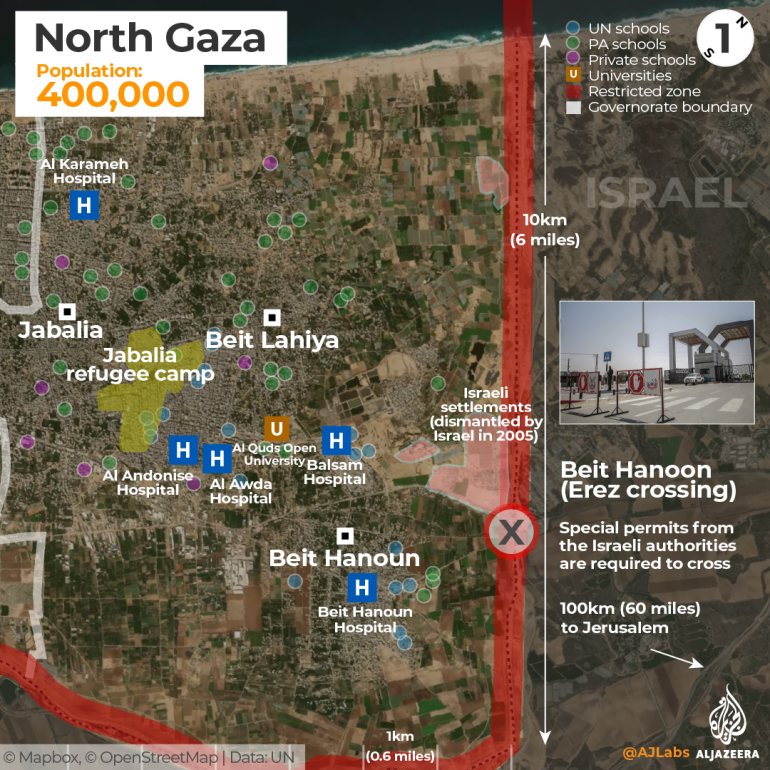
-
It’s 12:45am (22:45 GMT) in the occupied Palestinian territories and Israel, so let’s bring you up to speed with the latest developments:
- Israeli tanks are just 20 metres (65 feet) away from al-Quds Hospital and firing at the facility with about 14,000 displaced people sheltering inside.
- Al-Shifa Hospital’s director says two premature babies have died after being taken out of incubators because of power outages. He says the medical complex is “completely cut off, any moving person targeted” by Israeli forces.
- Israeli troops conducted a raid in the occupied West Bank city of Jenin. At least one person was killed while another was shot dead in Arraba, a nearby town, according to the health ministry.
- Arab and Muslim leaders concluded an emergency summit of the Arab League and Organisation of Islamic Cooperation where they condemned Israeli “aggression” on Gaza and demanded a ceasefire.
- In his second speech since October 7, Hezbollah leader Sayyed Hassan Nasrallah said the armed group used new types of weapons and struck new targets in Israel, and pledged the front against Israel would “remain active”.
- Hundreds of thousands of people took to the streets of London demanding an immediate ceasefire in Gaza and for the end of the Israeli occupation of Palestine.
- At least 11,078 Palestinians have been killed in Israeli attacks on Gaza since October 7. In Israel, after a downward revision, the death toll now stands at more than 1,200.
Belgian MP joins solidarity protest for Palestinians: ‘We need to sanction to end this occupation’Why is Western media accused of bias on Israel-Palestine? The world’s television screens, newspapers and online media have been filled with pictures of Israel’s war on Gaza.
Modern technology means there’s more media coverage than ever before but some of it has been criticised – by journalists themselves. Hundreds of them have signed a letter accusing Western media of biased reporting of the Gaza war.
Are the allegations fair?
Why are Western media accused of bias on Israel-Palestine? | Inside Story US not utilising leverage over Israel ‘effectively’: Analyst
Sahar Khamis, a professor at the University of Maryland, says there has been growing sentiment in the US to save the lives of innocent civilians in Gaza.
“Atrocities” being committed by Israeli forces are now available for everyone to see on social media, she noted.
But despite growing pressure, the Biden administration has not responded in a way that is “firm, decisive, strong, or satisfactory to meet these demands”, Khamis said.
While the US has leverage over Israel, it is not being used “sufficiently or productively” to put an end to Israel’s attacks, she added.
Her comments come as diplomats in the US State Department have been criticising US policy on the war on Gaza.
The future of Palestine: two-state solution more distant that ever In Pictures: From Paris to Karachi, protesters rally in support
Across the world, demonstrators call for an immediate ceasefire and urgent humanitarian action in Gaza.
Major cities, including New York, London, Paris, Baghdad, Karachi, Berlin and Edinburgh, witnessed large marches on Saturday.
See all the images here.

Demonstrators wave Palestinian flags as they protest in Pamplona, northern Spain [Alvaro Barrientos/AP] Five Israeli soldiers killed in heavy fighting: Military
The Israeli army says five soldiers were killed during battles in the Gaza Strip.
The Israeli Ynet news website cited a military statement saying four soldiers were killed in a booby-trapped tunnel in Beit Hanoun in northern Gaza while the fifth died in fighting elsewhere.
The number of Israeli soldiers killed since the start of ground operations on October 27 rose to 43.
The army is facing fierce battles from armed Palestinian groups in different areas across Gaza.

Smoke rises as buildings in Gaza’s Beit Hanoun are bombed [Mostafa Alkharouf/Anadolu Agency] ‘Don’t make the mistake’: Netanyahu warns Hezbollah
Israel’s leader issued a stark warning to Lebanon’s Hezbollah after the defence minister did the same earlier in the day.
“Don’t make the mistake of going to war. That would be the mistake of your life… Your entry into the war will seal the fate of Lebanon,” Benjamin Netanyahu said.
Hezbollah leader Nasrallah earlier said the armed group used new types of weapons and struck new targets in Israel, and pledged the front against Israeli would “remain active”.
Israeli govt says Israeli citizen killed in rockets fired by Hezbollah's retaliatory attack
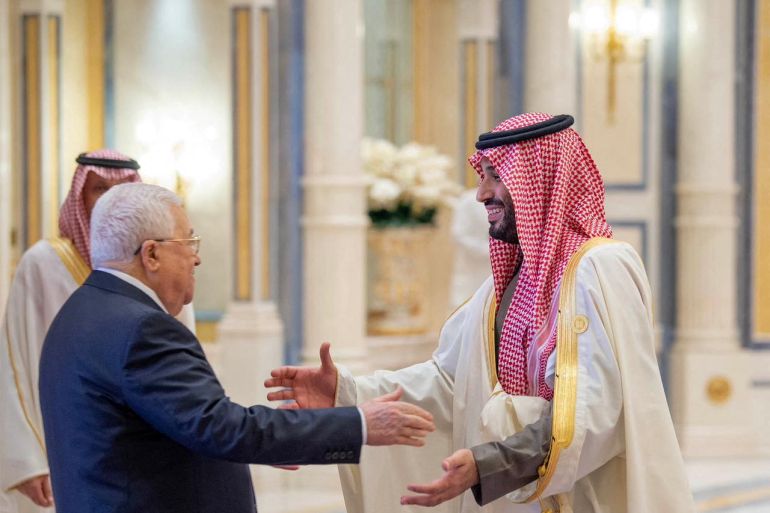
Saudi Crown Prince Mohammed bin Salman has been on a diplomatic push on Gaza [Saudi Press Agency/Handout via Reuters] Published On 11 Nov 202311 Nov 2023An Arab-Islamic summit hosted by Saudi Arabia called for an end to the war in Gaza and rejected justifying Israel’s actions against Palestinians as self-defence.
The summit on Saturday condemned “Israeli aggression on the Gaza Strip, war crimes and barbaric and inhumane massacres by the occupation government”, a final communique said.
It also called for an end to the siege on Gaza, allowing humanitarian aid into the enclave and halting arms exports to Israel, following the meeting in Riyadh.
The leaders demanded that the UN Security Council adopt “a decisive and binding resolution” to halt Israel’s “aggression” in Gaza.
Originally, only the 22 members of the Arab League were expected to participate, but the meeting was later expanded to include the Organization of Islamic Cooperation (OIC), a wider association of 57 mostly Muslim-majority states to which the Arab League countries belong.
Al Jazeera’s Hashem Ahelbarra said that without consensus among the summit attendees, its outcomes are useless.
“People do understand that the Israelis don’t really care about what is happening at this summit between the OIC and Arab League leaders. When you look at the communique you get a sense that the Arab and Muslim leaders do not have a mechanism to push a ceasefire and humanitarian corridor,” Ahelbarra said.
“This summit was just for the sake of a semblance of unity … in the Arab and Muslim world. It’s a watered-down statement. Not all Arab leaders decided to attend this summit because of the huge differences and divisions among the key players of the summit. That’s why they put this vaguely worded statement for public consumption,” he added.
In the opening remarks, Saudi Crown Prince Mohammed bin Salman (MBS) called for an immediate cessation of military operations in Gaza and the release of all captives and prisoners.
“This is a humanitarian catastrophe that has proved the failure of the international community and the UN Security Council to put an end to Israel’s gross violations of international humanitarian laws, and prove the dual standards adopted by the world,” he said.
“We are certain the only cause for peace is the end of the Israeli occupation and illegal settlements, and restoration of the established rights of the Palestinian people and the establishment of the state on 1967, with East Jerusalem as its capital,” MBS added.
Turkish President Recep Recep Tayyip Erdogan said that Israel was taking revenge on Gazan babies, children and women, as he renewed his call for an immediate ceasefire.
“What is urgent in Gaza is not pauses for a few hours, rather we need a permanent ceasefire,” he added. “We cannot put Hamas resisters defending their homeland in the same category as the occupiers.”
Palestinian Authority President Mahmoud Abbas highlighted that besides Gaza, Israeli forces’ raids in the occupied West Bank have also escalated and called on the United States to put an end to “Israel’s aggression, the occupation, violation and desecration of our holy sites”.
“No military and security solutions are acceptable as they have all failed. We categorically reject any efforts to displace our people from Gaza or the West Bank,” Abbas added.
Qatar’s Emir Sheikh Tamim bin Hamad Al Thani questioned for how long the international community will treat Israel as if it is above international law.
“The international world remains immune in front of all these scenes. Who could have imagined that hospitals could be publicly shelled in the 21st century?” he asked.
‘A unified collective position’
Saudi Arabia’s Ministry of Foreign Affairs said the joint Arab League and OIC meeting was being held “in response to the exceptional circumstances taking place in the Palestinian Gaza Strip as countries feel the need to unify efforts and come out with a unified collective position”.
The OIC includes member states from across the Islamic world, including the Palestinian territories’ neighbours Egypt and Jordan, Lebanon, Turkey and Iraq.
Abdel Fattah el-Sisi, the president of Egypt, emphasised that the policy of “collective punishment” by killing, siege and forcible transfer, is unacceptable.
“This cannot be interpreted as self-defence and must be stopped immediately”.
With Iran repeatedly warning that the scope of war will expand if Israel does not stop its attacks, President Ebrahim Raisi also attended the meeting in Riyadh, marking the first visit by an Iranian president in 11 years.
“Blind bombardment against Gaza must stop,” Raisi said, adding that “Islamic governments should designate the army of the occupying and aggressor regime [Israel] as a terrorist organisation”.
Raisi highlighted that Washington is supporting Israel in the United Nations and vetoes resolutions that prevent the killing of Palestinians.
-
What Would It Look Like If You Were Standing On The Wrong Side Of History? |
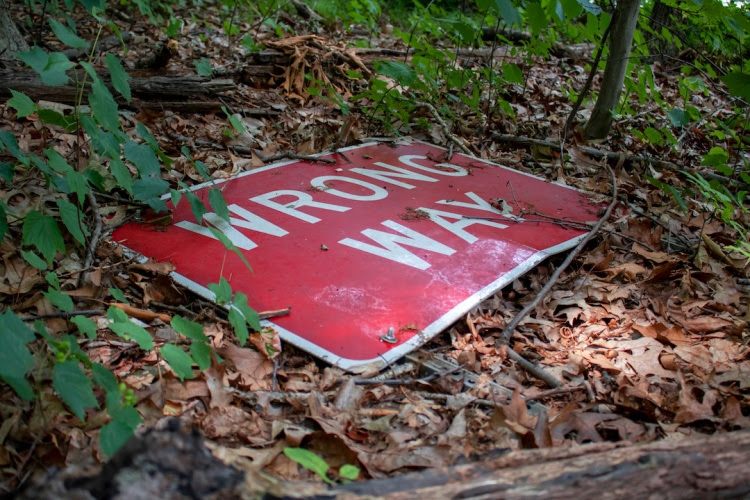
What Would It Look Like If You Were Standing On The Wrong Side Of History?
|
Netanyahu says not seeking to ‘occupy’ Gaza but ‘demilitarise’ it
Israeli leader says ‘civilian government’ should rule enclave after Hamas is defeated.

Israeli Prime Minister Benjamin Netanyahu has denied that his country has any plans to reoccupy Gaza
10 Nov 2023
Ex-Israeli justice minister: ‘Premature’ to speak about Israeli presence in post-war Gaza
US ‘humiliated every day’ in its relationship with Israel: AJ analyst
Israeli Prime Minister Benjamin Netanyahu has said his country does not intend to “occupy” or govern Gaza after the end of its war with Hamas, but the enclave must be “demilitarised, deradicalised and rebuilt”.
In an interview with Fox News aired on Thursday, Netanyahu said that Israel would need to find a “civilian government” to govern the enclave, which has been run by Hamas since 2006, without specifying who would form such a body.
“We don’t seek to govern Gaza, we don’t seek to occupy it. But we seek to give it and us a better future … and that requires defeating Hamas,” he said. “I’ve set goals, I didn’t set a timetable because it can take more time.”
Gaza, however, is already viewed as an occupied territory because Israel has full control of its borders, airspace and territorial waters despite having formally withdrawn its forces and settlers from the enclave in 2005. In 2007, Israel began enforcing a suffocating blockade on the territory which it had captured along with other Palestinian territories – occupied East Jerusalem and the West Bank – in the 1967 War.
While Israel has argued that the 2005 withdrawal marked the end of the occupation, experts in international law such as former UN special rapporteur Michael Lynk maintain that it never ended as the Israeli military continues to exercise “effective control” over the territory.
In his interview, Netanyahu said that a “credible force” would be needed to enter Gaza as necessary to “kill the killers” and “prevent the re-emergence of a Hamas-like entity”.
Netanyahu’s comments come days after he said Israel would take responsibility for Gaza’s security for an “indefinite period” after the end of its war with Hamas, prompting pushback from the United States.
On Tuesday, White House national security spokesperson John Kirby said that President Joe Biden did not believe that reoccupying Gaza would be the “right thing to do”.
US Secretary of State Antony Blinken said on Wednesday that the conditions for “durable peace and security” would include “no reoccupation of Gaza after the conflict ends”.
Israeli officials have said that Netanyahu’s comments about managing Gaza’s security did not suggest Israel would assume administrative control of the enclave, but conflicting statements by senior members of the government, including Defence Minister Yoav Gallant, have created confusion about its plans.
US officials have previously suggested that the Palestinian Authority should govern Gaza after the war, which Palestinian President Mahmoud Abbas has said would only be possible under a political solution that returns territory captured by Israel in the 1967 Arab-Israeli War.
Netanyahu on Thursday reiterated his opposition to a ceasefire with Hamas, as the Biden administration announced that its ally had agreed to daily four-hour pauses in fighting to allow civilians to flee hostilities.
“A ceasefire with Hamas means a surrender to Hamas, surrender to terror,” Netanyahu said, adding that Israel’s military was performing “exceptionally well” and would continue its campaign “however long it takes.”
Israel has promised to eliminate Hamas in response to the armed group’s October 7 attacks on the country, which Israeli officials say killed 1,405 people, mostly civilians.
Israel’s bombardment of Gaza has killed at least 10,569 Palestinians, including 4,324 children, according to the health ministry in the enclave.
KEEP READING
list of 4 items
Israel strikes Gaza’s biggest hospital complex, health officials say
Photos: This Israel war has no mercy, Gaza rescue workers say
Gaza’s Christians fear ‘threat of extinction’ amid Israel war
‘Like breathing poison’: Children in India’s Delhi hit hard by smog
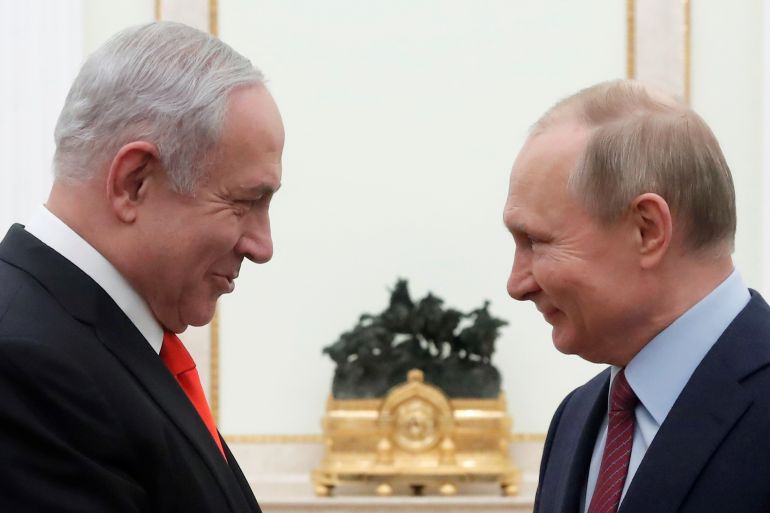
















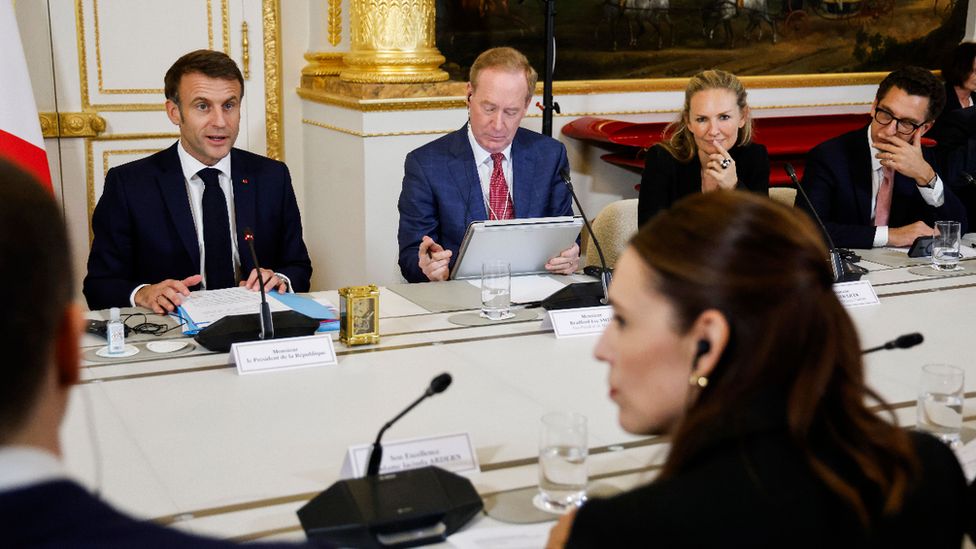
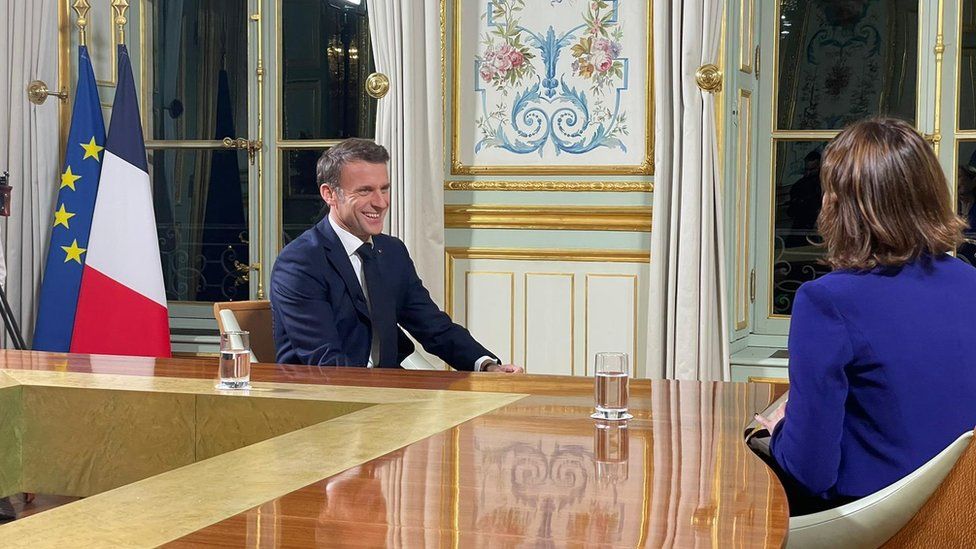











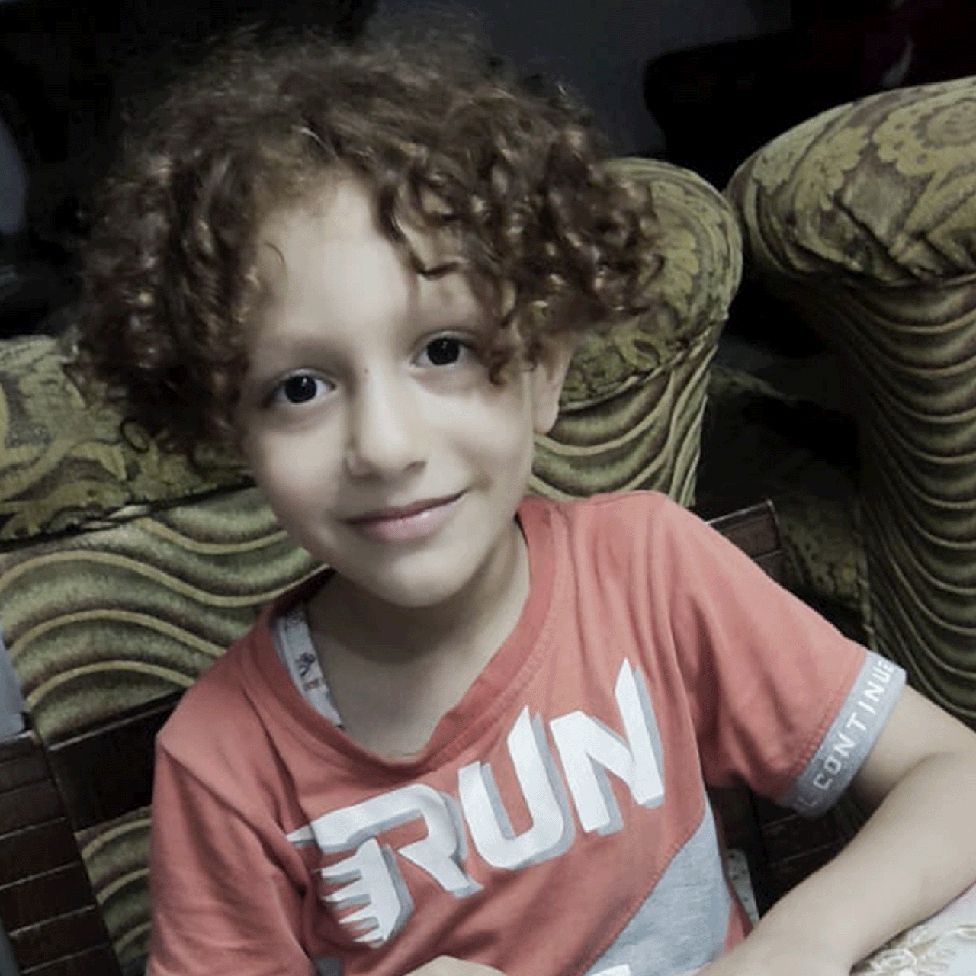
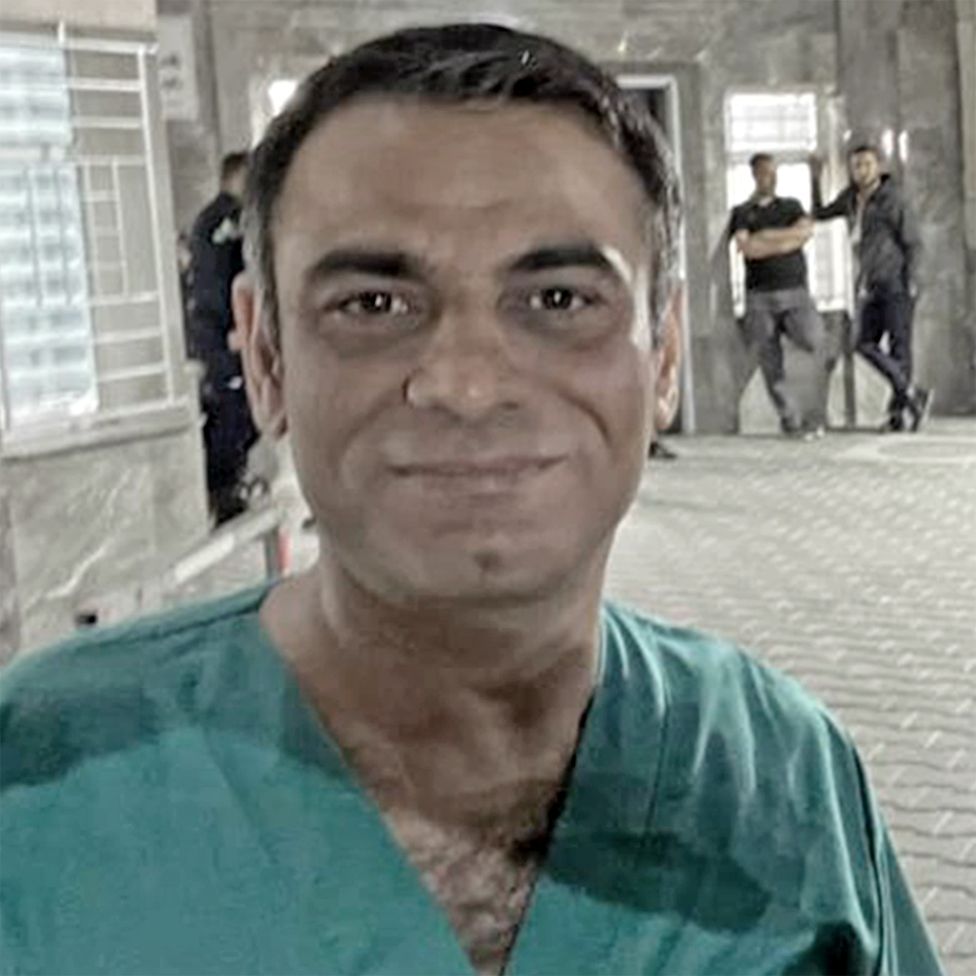
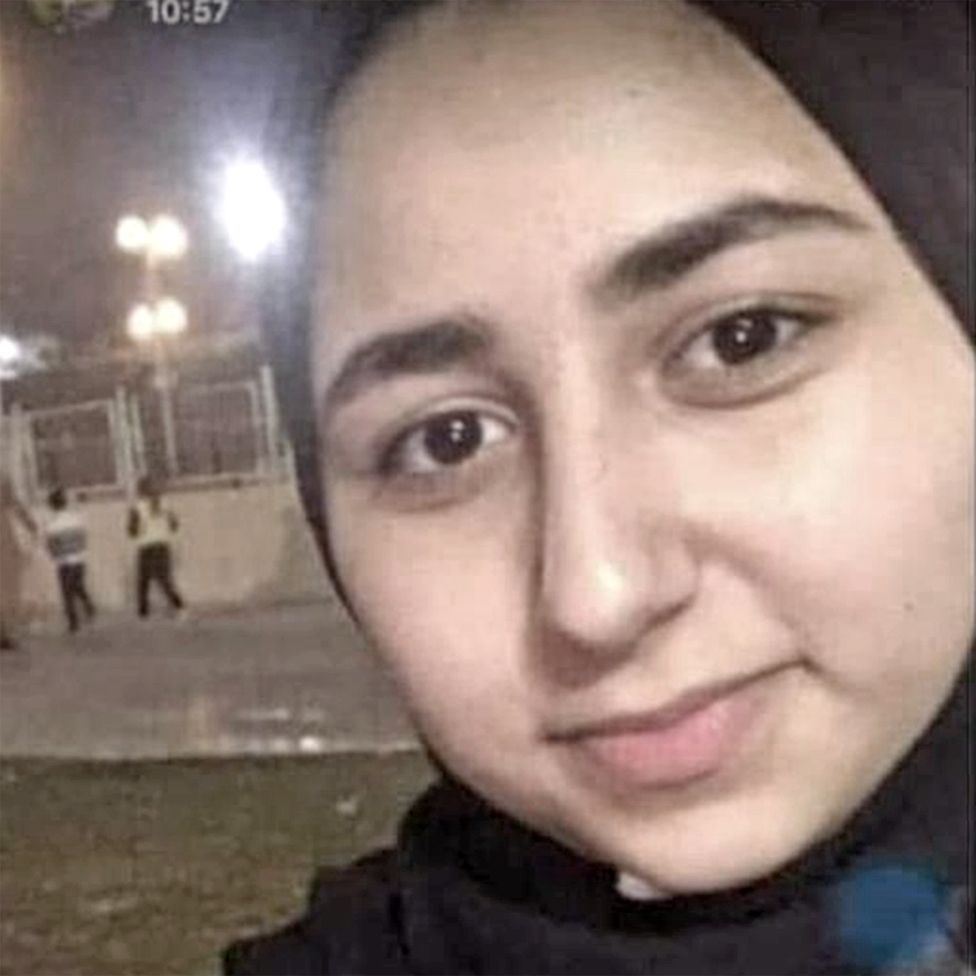
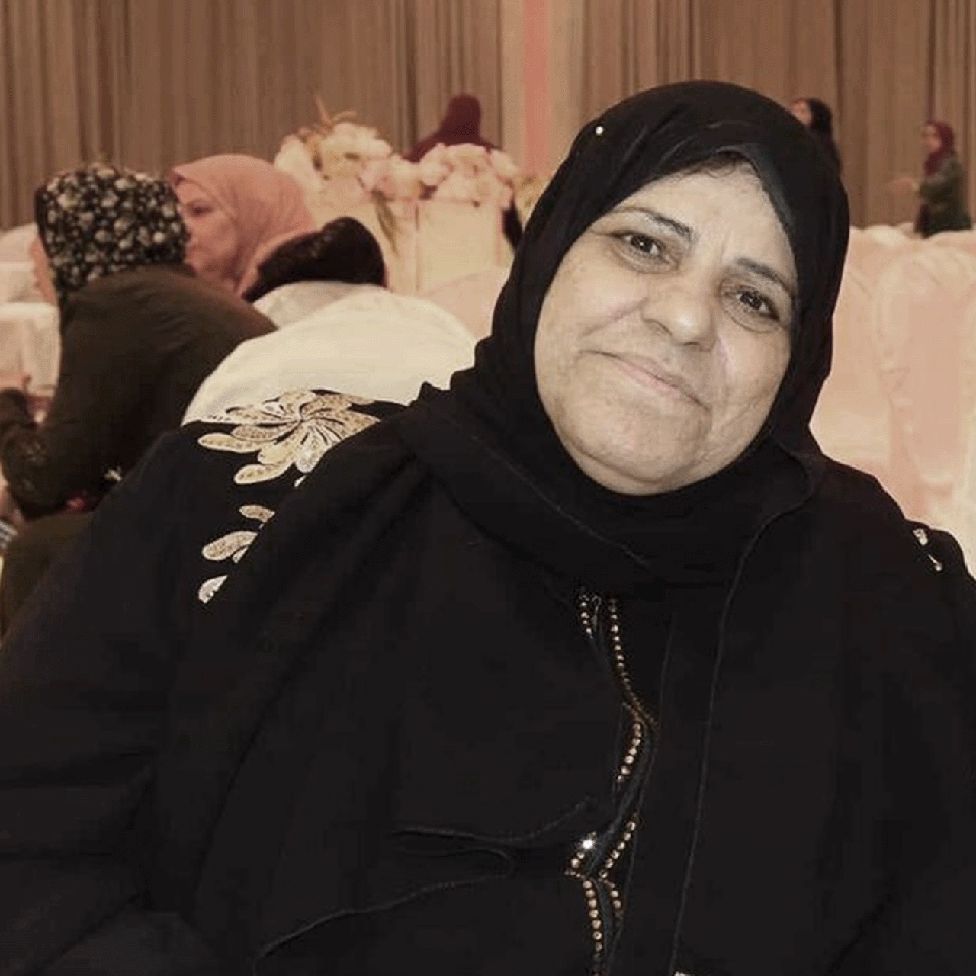





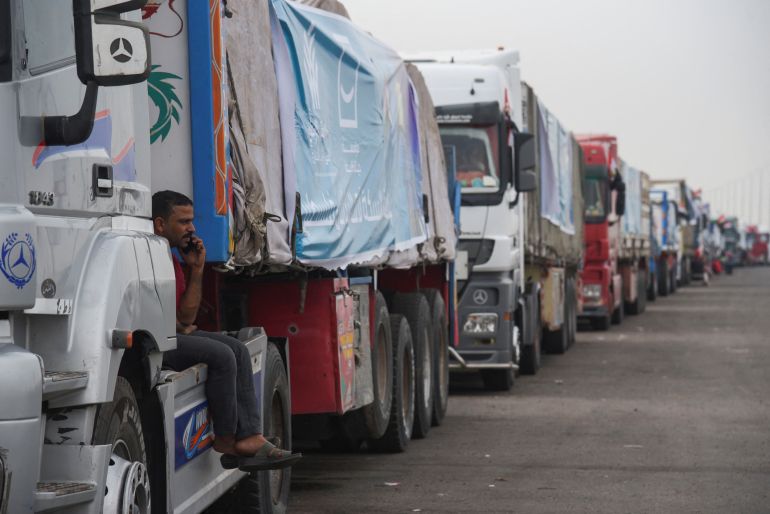
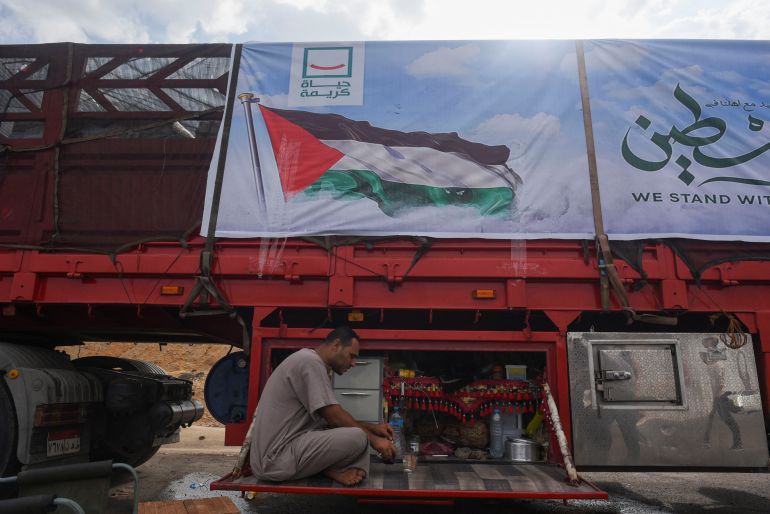

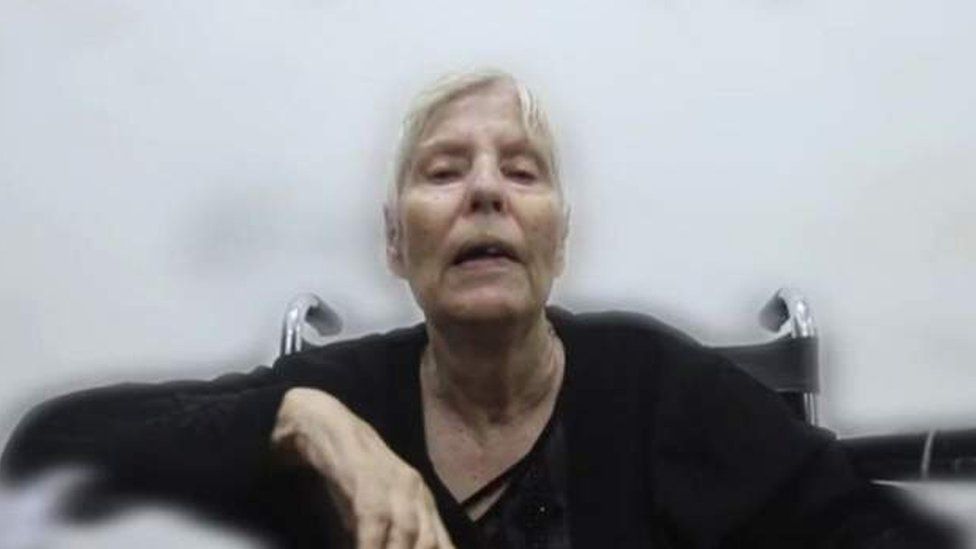
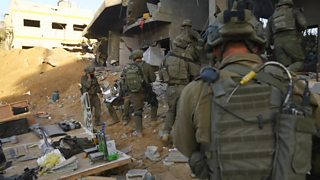
![Hezbollah supporters hold pictures of their relatives who died fighting with Hezbollah as they listen to a speech of Hezbollah leader Sayyed Hassan Nasrallah via a video link, during a ceremony marking the "Hezbollah Martyr Day," in the southern Beirut suburb of Dahiyeh, Lebanon, Saturday, Nov. 11, 2023 [Hassan Ammar/AP Photo]](https://ci3.googleusercontent.com/proxy/5LIcco4WXsCVcD0IZXa8V2U_mlFt01j_k4MJIOa3qaQFpXx0YO83wB1h80v9TLsyy9oz7l6uzWV6qRsHYBHw1t76x6kM-In-ZK9UCbNiyXQm6zffYQ6-JgR_IRwzwSgHzi0jtXRHR_ePTF3_kU5lmiGI9s_NC1hBu2oBiDgkSkX3Q5HVJGYHbds=s0-d-e1-ft#https://www.aljazeera.com/wp-content/uploads/2023/11/AP23315545144193-1699717718.jpg?w=770&resize=770%2C513&quality=80)
